 18/01/2010 20:41 18/01/2010 20:41 |
|
| | | OFFLINE | | Post: 19.300
Post: 1.942 | Registrato il: 28/08/2005
Registrato il: 20/01/2009 | Administratore | Utente Veteran | |
|

 See preceding page for earlier posts today, 1/18/10.
See preceding page for earlier posts today, 1/18/10.


 Dialog with the Jews must acknowledge
Dialog with the Jews must acknowledge
the centrality of Israel in Jewish identity
The Apostolic Nuncio to the Holy Land, the Custos of the Holy Land and the Latin Patriarch of Jerusalem
were among those invited to take part in Benedict XVI’s meeting with Rome’s Jewish community.
The relationship between the State of Israel and the Church in the Holy Land is central to the future
of Catholic-Jewish dialogue.
by David-Maria A. Jaeger, OFM
 Fr. Jaeger is a Catholic Jew and serves with the Franciscans in the Holy Land. He is a member of the Holy See delegation in the bilateral talks with Israel.
Fr. Jaeger is a Catholic Jew and serves with the Franciscans in the Holy Land. He is a member of the Holy See delegation in the bilateral talks with Israel.
Rome, Jan. 18 (AsiaNews) - It would seem to be de rigueur by now for the reigning Pontiff to make a visit to the Great Synagogue of Rome – like the exchange of visits between the Pope and the President of the Italian Republic – and it is good that this is so. It is comforting.
To be sure, in each case, it is a choice the Pope makes with sovereign freedom, but an expected one, nonetheless, a foreseeable one.
Truly “historic” and properly “epoch making” importance is inevitably reserved to the very first occasion - a historical first is by its nature unrepeatable.
But if the Holy Father's visit to the Rome Synagogue yesterday was not the historic 'first' made by the Venerable John Paul II in 1986, future historians may yet see it as “epoch making” in its own right.
And this may well be due to a truly singular circumstance: That the Vatican included the presence in the Pope's delegation of the principal Authorities of the Catholic Church in Israel: The Apostolic Nuncio, the Custos of the Holy Land, the Latin Patriarch of Jerusalem.
It is true that the territorial jurisdiction of the respective missions of the Custos and the Patriarch extend well beyond the confines of the Jewish State, but they do include it in its entirety.
Their presence yesterday appears to me extremely eloquent by itself. In effect, it opportunely reflected – and highlighted – the centrality of Israel in the relations between Catholics and Jews everywhere.
For decades the Jewish officials who participated in the structured formal dialogues with the Catholic Church in general, and with the Holy See in particular, have insisted on recognition by the Church of the central role that, in their eyes, the Jewish State plays in the awareness Jews have today of their own identity.
But the Catholic participants, duly faithful to the “models” proper to our own Catholic religion, have found it difficult to place a political, temporal, contingent entity, a State no less, within the context of a religious, moral and spiritual dialogue.
The Christian faith, like the biblical teaching of the Prophets of Israel, does not permit the assignment of intrinsic religious value to any merely human, contingent, temporal entity, which is instead subject to judgment according to its conformity at any given time with the values and the requirements of (natural and positive) divine law.
But, in truth, the dialogue with exponents of the Jewish religion, in its diverse “denominations” (Orthodox, Conservative, Reformed, with their myriads of sub-distinctions), is only one dimension of any relationship with the Jewish People, which has for a long time now included many members who do not profess or practice their ancestral religion, but who nonetheless value deeply their Jewish identity, and their bonds of solidarity with the whole People of Israel.
For these in particular – but not only for them – Jewish identity today is defined by sympathy, support and concern for the State of Israel.
This is a reality that does indeed go beyond our own pre-constituted “models” – because we Catholics are a religion, the Church, not 'a people', one among the peoples of the world. Catholicism is a religion shared by many Christian Jews - Catholics, Protestants, Jews for Jesus - who cannot be left out of the dialog between Catholics and Jews (but this is another subject).
Restricting dialogue with the Jewish People to the “religious” sector alone, would risk impoverishing it, limiting it only to “religious professionals” and to their learned discourse and theological “disputations”.
The truly new era inaugurated by the signing, on 30 December 1993, of the Fundamental Agreement between the Holy See and the State of Israel, changed the terms of the discourse, broadened and re-oriented it.
Without abandoning but rather revitalizing the specifically religious dialogue between Catholic and Jewish religious leaders, the central point of reference for the overall relationship between the Catholic Church and the Jewish People becomes the decisive relationship between the Church in the Holy Land and the Jewish State.
This State of Israel committed itself, by its own deeply secular Declaration of Independence (14 May 1948), to recognise the rights and freedoms of various religions - be they inherent or acquired rights - and to ensure “perfect equality” for all persons in its territory.
The Fundamental Agreement expresses, in effect, the shared will of the Parties to translate these primordial commitments into concrete norms and procedures - a shared will that has still a long way to go before being carried out completely.
[I wish Fr. Jaeger had devoted at least a line here to explain why the implementation has been delayed all this time - 14 years now - because such long drawn-out negotiations are difficult for the ordinary Catholic to understand. It seems to reflect bad faith on the part of the Israelis - as though they do not really want this Agreement ever to go into effect!]
Thus, assigning to Israel the right status in the dialogue between Catholics and Jews – as many Jewish participants in the “institutional” dialogues have long called for – should not be feared by Catholics as indicating support for the state of Israel's temporal policies, [any more than it does for any other state with which the Vatican has diplomatic relations].
On the contrary, it should be an occasion for contributing, however modestly (as befits a “little flock”), to the civil progress of a society and a political community that, humanly speaking, holds in its hands the fate of the presence, the life, the work and the witness of the Church of Christ in the land of his birth.
Indeed, a relationship of dialog between Catholics and Jews at this time that is not also decisively focused on the state of relations between the Jewish State and the Church in Israel, would seem artificial and unreal - one bogged down in the past while needing instead to be firmly placed in the present and oriented towards the future - the present that we are shaping day by day, and the future that is ours to build together.
[Modificato da TERESA BENEDETTA 19/01/2010 10:35] |
| |
|
| |
 18/01/2010 22:30 18/01/2010 22:30 |
|
| | | OFFLINE | | Post: 19.301
Post: 1.943 | Registrato il: 28/08/2005
Registrato il: 20/01/2009 | Administratore | Utente Veteran | |
|

 Serbian bishop says Pope
Serbian bishop says Pope
may visit in 2013

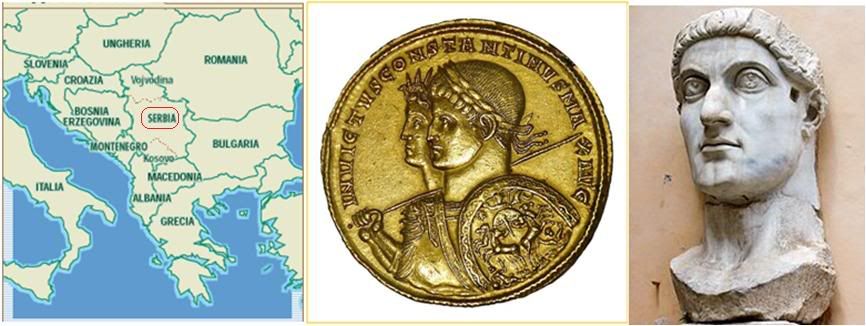 Constantine the Great (272-337) was Roman Emperor from 306 to his death. Center photo, imperial coin from 313; right, head of the so-called Constantine Colossus, a 12-meter high statue of the emperor during his lifetime, now in Rome's Museo Capitolino.
Constantine the Great (272-337) was Roman Emperor from 306 to his death. Center photo, imperial coin from 313; right, head of the so-called Constantine Colossus, a 12-meter high statue of the emperor during his lifetime, now in Rome's Museo Capitolino.
BELGRADE, January 18 (Translated from ANSA) - Pope Benedict XVI could visit Orthodox Serbia in 2013 on the 1700th anniversary of the Edict of Milan through which the Roman Emperor Constantine put an end to Christian persecution, according to the Bishop of Nis, Irinej, quoted by the Serbian news agency Beta.
Niz, third city of Serbia, in the southwest, was the birthplace of Constantine.
"We had already presented the idea earlier for a visit to Serbia by the Pope, but this time there is a real occasion, and the Orthodox Church in Serbia would be most happy to welcome him," said Bishop Irinej, one of the possible successors to the Patriarchy of Serbia, after the death of Pavle last month. The election will take place on January 22.
He sees a papal visit as "an occasion to further discuss the reunification of the Christian churches." It will be a long process, he said, "but every new step will bring us closer".
Irinej represents the moderate reform wing of the Serbian patriarchate, which has the support of Serbian president Boris Tadic.
To mark the anniversary of the Constantinian edict, the city of Nij plants to erect an 80-meter Cross on the top of Vinik hill outside the city.
Constantine, the first Christian emperor, is venerated as a saint by the Eastern Churches. He turned ancient Byzantium in Turkey into Constantinople, a capital of empire rivalling Rome.
|
| |
 18/01/2010 22:51 18/01/2010 22:51 |
|
| | | OFFLINE | | Post: 19.302
Post: 1.944 | Registrato il: 28/08/2005
Registrato il: 20/01/2009 | Administratore | Utente Veteran | |
|


 SOME REACTIONS FROM THE JEWISH SIDE
Israeli ambassador says the visit
SOME REACTIONS FROM THE JEWISH SIDE
Israeli ambassador says the visit
turned out to be a pleasant 'surprise":
Media did not get the crisis it expected
By Jesús Colina
Translated from
the italian service of

ROME, JAN. 18, 2010 (Zenit.org).- Israel's ambassador to the Holy See says Benedict XVI's visit to the Synagogue of Rome was not only a great help in the fight against anti-Semitism, but was also 'a pleasant surprise'.
Ambassador Mordechai Lewy told ZENIT: "The press had been generating an atmosphere of crisis, before the visit, and the media were very much disappointed that there was no crisis afterwards," he said, affirming this was a nice surprise.
The Holy Father visited both the synagogue and the Jewish Museum on Sunday evening, giving an address focused on what does and can unite Jews and Christians. It was the third time as Pontiff that he has visited a synagogue.
The Israeli envoy affirmed that with the Pope's visit also contributes greatly to the fight against anti-Semitism.
"I think it is very helpful," he said, "because the Holy Father has repeated and extended the meaning of Nostra Aetate, the Second Vatican Council's declaration on inter-religious dialogue - in this case, dialogue with Judaism.
Lewy said Benedict XVI goes "to the essentials of this dialogue."
He also feels the visit has a positive impact on Israel-Vatican relations, which "are of two kinds: There is a spiritual level, and a political level. We would want to have the both of them in good shape, and both of them are advancing in the right direction."
Lewy noted that the Pope referred to the presence of the members of the Mixed Commission of the Chief Rabbinate of Israel and of the Holy See during Sunday's event. Their meeting to dialogue on Catholic and Jewish teaching on creation and the environment began today.
The Israeli envoy characterized the political relationship between the Vatican and Israel as "very good."
"We are promoting [relations] on the level of culture, and in the level of negotiations, which are proceeding well," he said.
As for reaction in Israel to the Pope's visit, Lewy said it is too early to tell: "In Israel we have to get used to the idea that we must keep up dialogue with the Catholic Church as much as we can, but some differences will remain, and we will have to live with it. I think it is a learning curve".
A surprising slant from Riccardo Pacifici, who has found his voice as president of teh Jewish Community of Rome:
The start of a great dream
by RICCARDO PACIFICI
Translated from

January 18, 2010
We have a dream. That this event - beyond the media attention and the pleasantries (handshakes, photographs, TV broadcast) - may have a strong effect on individuals.
We now have the responsibility to translate our intentions and our dreams to reality, to break the wall of mistrust and fear, to open our hearts to the desire to know the other. This would be the best result of this historic encounter.
Historians may debate whether 1986 will repeat itself in some way. In 1986, Chief Rabbi Elio Toaff, in his address welcoming John Paul II, expressed the hope of a common commitment against apartheid in South Africa and for religious freedom in the Soviet Union.
And my predecessor [as president of the Jewish community of Rome], hoped for the opening of diplomatic relations between the State of Israel and the Vatican. All that became reality.
The time has come to work for new aspirations: for the freedom of those peoples - women in particular - who have been deprived of their civil rights and freedom of worship, often at mortal risk, by obscurantist and tyrannical dictatorships in the name of Islam.
We wish to liberate men and women of the Islamic faith in Italy and on the continent from the imams who preach hatred.
Only by strengthening the forces that express moderate Islam, who recognize the values in the principles of our Constitution, can we dissipate an atmosphere that is dense with prejudice, hostility, xenophobia and racism.
If we can succeed in doing this together, then we can say that this historic day in Rome will have been the start of a dream come true.
The Pope's visit:
Nothing was taken for granted',
says the Chief Rabbi of Rome
Translated from
the Italian service of

January 18, 2010
Alessasndro Gisotti spoke to Chief Rabbi Riccardo Di Segni the day after the Pope's visit to the Rome Synagogue:
DI SEGNI: I was intent on a Biblican reflection on the subject of brotherhood, because the Bible - our common root - explains that brotherhood is something very intimate but complicated. And that is why relations among brothers are as important as they are difficult.
Biblical narrative tells of total conflict between brothers that changes to reconciliation and peacemaking. This expresses very well in symbols the common road we face - it is full of difficulties but also of goodwill.
Both your address and that of the Pope stressed the common patrimony of Jews and Christians. How much of this patrimony can help mankind today, which is so riven by divisions?
That is the challenge now - we must find common means to convey a strong message of peace.
The Pope also pointed out that notwithstanding common roots, Jews and Christians often remain unknown to each other. Thus, there is a call for commitment in order to know each other better...
Yes, to know each other on various levels. There is personal knowledge, which can develop wherever there are Jews living in the midst of Christians. And there is the problem of getting to know the cultural patrimony, which is very much open and must be confronted.
Benedict XVI has now visited three synagogues, and one can say that after Peter, he is the first Pope to enter more than one synagogue. How impostant is it, in your view, that after the first visit by John Paul II, which was called 'extraordinary', it has become almost 'ordinary' for Benedict XVI?
After yesterday, we can say that it is becoming 'ordinary'. Before yesterday, it was not that clear. In fact, we could not take anything for granted about yesterday. It was difficult to make it happen, but in the end, we had a happy ending.
But one can never speak of 'routine' for events like this - it always takes a lot of hard work and good will.
But is it not beautiful to think it could become routine in the future?
Of course... But at the same time, a little 'movement' can make things more interesting and so, in this sense, not everything bad is harmful!
And after this intense encounter, what are your expectations of the dialog with Catholics?
I think the important thing is the atmosphere in which dialog takes place, the possibility to resolve problems such as those that have emerged lately. I think this is the most real and essential aspect that has emerged. We do not have a magic wand to resolve everything but at least, we are available and open to each other.
Philippa Hitchen spoke to Cardinal Walter Kasper about the prospects for Catholic-Jewish dialog:
CARD. KASPER: I think the visit constitutes a reinforcement of the dialog, because both sides have affirmed their determination to move forward with dialog, not only in the academic sense but as an exchange of values.
What the Holy Father said about the Ten Commandments is very important. This is our common heritage, but it is also a heritage for all men, and Jews and Christians should bear witness to these values that are expressed in the Ten Commandments - these are the values that the world needs today.
So you would say this visit was satisfactory?
Yes, it went very well for both sides. Of course, we have our differences, as well as concrete problems, which we can resolve in hostility or in friendship. Yesterday was an exercise in trust and friendship, so we can move forward. It shows that even after a long period of misunderstanding, we can start over, with the grace of God.
There were some touching moments, especially when the Holy Father shook hands with some of the survivors of the Nazi camps....
It is always very moving to meet survivors of the Shoah.... But it was also moving when he greeted the former chief Rabbi Elio Toaff, who contributed greatly to reconciliation and became a great friend of John Paul II... Yes, there were many touching moments, and also encouraging ones.
[Modificato da TERESA BENEDETTA 19/01/2010 00:14] |
| |
 19/01/2010 10:34 19/01/2010 10:34 |
|
| | | OFFLINE | | Post: 19.303
Post: 1.945 | Registrato il: 28/08/2005
Registrato il: 20/01/2009 | Administratore | Utente Veteran | |
|


 The Pope at the Rome Synagogue:
The Pope at the Rome Synagogue:
A turning-point in
the Jewish-Catholic dialog
by Massimo Introvigne
Translated from

January 18, 2010
Benedict XVI's visit to the Synagogue of Rome was covered by the media almost exclusively as an event that was preceded by controversy and should be accompanied by controversy.
They have minutely scrutinized every possible reference to disputes regarding the beatification of Pope Pius XII or lifting the excommunications of the Lefbevrian bishops, one of whom, Mons. Rcihard Williamson, had expressed negationist positions about the Holocaust.
In the past several months, Benedict XVI has intervened many times to reiterate that Pius XII - a holy man who is particularly dear to him - acted with discretion but also with wisdom and efficacy, to help, within the limits of what was humanly possible, Italian Jews whose lives were endangered by Nazi racial policy; and that his action towards the Lefebvrians was part of his effort to bring them back into full communion with the Church of Rome, a complicated issue that has nothing to do with negationism (which is an offense that the Pope has denounced in clear and strong words).
But I have to say that the insistence in Jewish circles - even after all the clarifications - on making a big deal of Pius XII and Bishop Williamson in the days leading to the January 17 visit is, frankly, interference in the internal affairs of the Church.
[I agree. For all that the Jewish opponents of Benedict XVI's actions now routinely say "We know it is not our business, but...", they go ahead and make it their business anyway by 1) asking that the Pope delay any further action on Pius XII's beatification; and b) saying that Pius XII as a saint would not be 'acceptable' to them! Not that the Church asks or expects people of other faiths to 'accept' its saints!]
An approach that one might say is very likely solicited and/or instigated by Catholic elements hostile to Benedict XVI and determined to insist on their interpretation of Vatican-II which the Pope has called a hermeneutic of discontinuity or rupture.
From this point of view, the 'defense' of Vatican-II by Rome's Chief Rabbi Riccardo Di Segni in his remarks to welcome the Pope yesterday sppears to be in questionable taste.
He said: "If what Vatican II produced [ Nostra aetate] comes to be minimized in any way, then there will no longer be an opportunity for dialog". [Also rather insulting to Benedict XVI - as though he would ever think of 'minimizing' a Vatican-II document! Not having seen any full text of Di Segni's remarks, I was not aware of this line.]
But the greatest objection to the media reporting of the event is that, as usual, it relegates the teaching of Benedict XVI to the background, a teaching which often has elements of novelty.
And at the synagogue, he spoke on two things of great importance. The first - which basically rebuts the polemics against the Church, but soars far above any contingent judgment - has to do with the tragedies of the 20th century and the responsibilty for those errors and horrors.
The Pope indicated clearly where the evil came from: "the terrible ideologies that had at their root idolatry of man, of race, and of the state, which had once more brought brother to slay his brother...
The unique and overwhelming tragedy of the Shoah represents, in some way, the culmination of a journey of hatred which begins when man forgets his Creator and places himself at the center of the universe".
Recalling his visit to Auschwitz on May 26, 2006, Benedict XVI reaffirmed that in killing so many men, the lords of the Nazi ideology ultimately 'intended to kill God".
Here is not just a response to the historically false conclusion that the Holocaust was a consequence of Catholic anti-Judaism, whereas from all accounts, it is the poisonous fruit of a radically anti-Catholic racist ideology.
But there is much more to his argument. The 20th-century ideologies - National Socialism which idolized race, but also Communism, which idolized the State, and secularist Illuminism, which prolaims the rights of man against the rights of God - these are segments in a pluri-century process of distancing from the Catholic truth, in which, to the contrary, it was sought to place man at that 'center of the universe' which is properly God's.
The results of this process, of which Nazism was a part without being its only manifestation, can only be odious and criminal.
The second subject - and here was the element of novelty - was the proposal to the Jews of a dialog that is not principally theological but which starts with reason and natural law.
The Ten Commandments that Jews and Christians have in common were revealed by God but they are also accessible even to the natural reasoning of any person in his right mind.
The decalogue "constitutes a beacon and a norm of life in justice and love, a 'great ethical code' for all of mankind. The Ten Commandments shed light on good and evil, on truth and falsehood, on justice and injustice, and they match the criteria of every human person’s right conscience".
Reason, in particular, is able to recognize the truth in the fundamental aspects of the Decalogue that are specially threatened today: "respect and protection of life" and "the sanctity of the family, in which the personal and reciprocal 'Yes', faithful and definitive, of man and woman, makes room for the future, for the authentic humanity of each, and makes them open, at the same time, to the gift of new life".
Even to "recognize the one Lord, against the temptation of constructing other idols, of making golden calves" - the first commandment - is really a goal which human reason is capable of reaching, since atheism and secularism, which are at the root of ideological horrors, are intrinsically irrational.
One cannot but notice the parallel between this proposal to the Jewish world of a dialog centered on natural law, which, God reminds us, in the Ten Commandments like a 'pro memoria' to mankind, which can understand it with reason - that these norms of nature impose themselves on everyone, believer and non-believer, who is gifted with reason - is the analogoous proposal that Benedict XVI has made so many times to the Muslim world.
The Pontiff does not deny interest in a theological dialog, which for the Muslims is focused on the reciprocal role of the Bible and the Koran, or how Islam views the figure of Jesus Christ, and for the Jews, on the significance of the role of the Ancient Covenant for the Jewish people after the coming of Jesus Christ and the New Covenant with the Church. Topics which are certainly interesting, and not only to specialists.
Nonetheless Benedict XVI has demonstrated several times the limits of a theoretical dialog that is good almost exclusively only for academics and congresses. In a world characterized by so many tragedies and violence, the most urgent and concrete dialog - that which goes beyond specialists and can engage even common people, that which can truly resolve problems and conflicts here and now - can only start from reason.
If every religion argues exclusively from its own faith, a confrontation is certainly possible, but to reach a consensus becomes entirely a matter of chance.
But if everyone argues from reason - which is neither Christian nor Jewish nor Muslim, and which believers and non-believers have in commmon - to find a consensus at least on some minimal principles of natural law is possible.
It is consensus on these principles that could avoid the tragedies and violence which marked the 20th century and continue to mark the 21st.
This is the true turning point in the inter-religious dialog proposed by Benedict XVI, the Pope of reason. Contingent controversies should not obfuscate this great teaching.
Andrea Tornielli had a similar analysis:
The news from the Synagogue:
To undertake a common task
based on the Ten Commandments
by Andrea Tornielli
Translated from

Everything can be said of the Pope's visit to the Rome Synagogue yesterday except that it was a 'formal' meeting. ['Formal' in the sense of 'for the sake of appearances'.]
Thee was no formality in the tone and contents of the remarks by the Jewish leaders who addressed the Pope.
There was no formality in the response of the Bishop of Rome, who - having been invited by the Chief Rabbi, it must be recalled - wished to repeat an action by his predecessor to underscore once more that there is no turning back on the 'irrevocable' line set by Vatican II, notwithstanding differences destined to remain differences, notwithstanding problems and difficulties in Jewish-Catholic relations.
The president of the Roman Jewish community, Riccardo Pacifici, and the Chief Rabbi Riccardo Di Segni seemed to have divided up their assignments.
The first had a more 'political' perspective, and called for a common fight for religious freedom against fundamentalism, citing the re-emergence of anti-Semitism and Iran, without mentioning it by name.
But he did not avoid saying the name of Pius XII, whom Papa Ratzinger had declared Venerable, promulgating his 'heroic virtues' less than a month ago.
The figure of Papa Pacelli, the decision to proceed with his beatification process, and the contradictory judgments about his actions in World War II, had cast a shadow on the visit, even to the point of risking its cancellation.
Pacifici criticized Pius XII's 'silence' on the Shoah, a silence that is also denounced by some Italian survivors of the Nazi persecution in a letter that a nephew of one of them, Alberto Mieli, handed to the Pope after his speech.
[I must object to this shorthand - 'silence on the Shoah' - for the simple reason that during the war years, no one outside of the Nazis realized it was a 'Shoah' or Holocaust, not even the Jews themselves, and I daresay, not even those who became victims themselves in the Nazi lagers, whom one can hardly expect to even think of the larger picture when confronted with their own imminent execution. .
No one, outside the Nazi high command and those who were executing their so-called Final Solution of the Jewish problem, was aware of the extent and degree of their persecution by the Nazis - the extermination of tens of thousands in gas chambers, for instance, or that the total number of victims would reach the horrifying total of six million, did not come to light until after the war!
But to say Pius XII kept silent about the Shoah makes his 'silence' appear even more unforgivable in the eyes of his detractors, and so this has been codified into a convenient but erroneously damning shorthand that even someone like Tornielli, who has written the most authoritative biography of Pius XII to date, falls into the trap of using!]
Even Di Segni spoke of the silences of man and the judgment for it which he cannot escape.
[Right - and that judgment can only be made by God. But Pius XII's detractors are arrogating that judgment to themselves, here and now, regardless of facts.
As I commented earlier, does not Judaism believe in the possibility of penance? Who of us can imagine the spiritual torment that a holy man like Pius XII, a Pope no less, had to undergo while weighing the pros and cons of speaking out or not?
Is it not right to ask oneself - If I were Pope in his place, what would I have done? And realize that there is no simple obvious answer when one has to make a moral choice that has extensive practical consequences for tens of thousands, one way or the other?
And what Catholic can doubt that Pius XII would have spoken of this moral dilemma to his confessor, and sought God's forgiveness if his decisions had in any way betrayed God's will and were not done for the greatest good to the greatest number?]
Benedict XVI, in the face of these explicit though not unexpected references, chose not to cite his predecessor by name, but defended him nonetheless, recalling the rescue and assistance extended by the Vatican to the Jew of Italy during the war.
The papal address was not a meditation on the common theological roots of Judaism and Christianity, a subject about which Joseph Ratzinger - a profound connoisseur of Jewish culture and faith - has meditated numerous times before.
Even this is a moot question, and in fact, the Pope was scheduled to meet Monday with Rabbi Jacob Neusner, who was at the Synagogue, visiting from the United States, disputes the idea that Christianity is an offshoot of Judaism.
The novelty of the papal intervention - beyond the ever important and certainly ever expected condemnation of anti-Semitism and the acknowledgment of Christian responsibility for anti-Jewish hatred in the past - lies in Benedict XVI's explicit identification of a common commitment and task to be carried out together in the future.
First, Di Segni, and then the Pope more explicitly, pointed out some features of this commitment.
On the environment, for instance, in favor of a human ecology that does not idolize nature but is conscious that man is the peak of Creation. The defense of the family, fundamental cell of society. The protection of life from its very beginning, the defense of the weakest and the neediest, and of human dignity which is still so downtrodden in many parts of the world.
Jews and Catholics can join hands and hearts on the basis of the Ten Commandments. And they can contribute together, along with Muslims who reject hatred and violence, to the construction of 'a world with a more human face'.
[Modificato da TERESA BENEDETTA 19/01/2010 12:28] |
| |
 19/01/2010 14:19 19/01/2010 14:19 |
|
| | | OFFLINE | | Post: 19.304
Post: 1.946 | Registrato il: 28/08/2005
Registrato il: 20/01/2009 | Administratore | Utente Veteran | |
|
[Modificato da TERESA BENEDETTA 19/01/2010 15:16] |
| |
 19/01/2010 16:21 19/01/2010 16:21 |
|
| | | OFFLINE | | Post: 19.306
Post: 1.948 | Registrato il: 28/08/2005
Registrato il: 20/01/2009 | Administratore | Utente Veteran | |
|
 Tuesday, January 19
Tuesday, January 19
 ST. FABIAN (d. 250), POPE AND MARTYR
ST. FABIAN (d. 250), POPE AND MARTYR
Fabian was a Roman layman who came into the city from his farm one day in 236, as clergy and people were preparing
to elect a new Pope. Eusebius, historian of the early Church, says a dove flew in and settled on the head of Fabian.
This sign united the votes of clergy and laity and he was chosen unanimously. He led the Church for 14 years and was
one of the first martyrs killed during the persecution of Decius in 250 AD. He is credited with having Christianized
Gaul (now France), sending out seven trusted bishops to do this. St. Cyprian wrote That Fabian was an 'incomparable'
man whose glory in death matched the holiness and purity of his life. He was buried in the catacombs of St. Callistus;
his gravestone, broken into four by time, bears the Greek words, “Fabian, bishop, martyr.”
Readings for today's Mass: www.usccb.org/nab/readings/011910.shtml
OR for 1/18-1/10/2010:
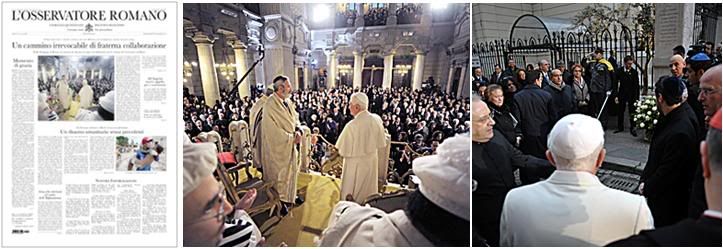
The Pope calls on Jews and Catholics to bear common witness in our time:
'An irrevocable journey of fraternal collaboration'
The double issue has a full coverage of the Holy Father's visit to Rome's Great Synagogue on Sunday afternoon,
with a few sidebars containing reportage not found in the regular news reports, and the only photo seen so far
of the Pope's floral offering at a marker for Roman victims of the Shoah.
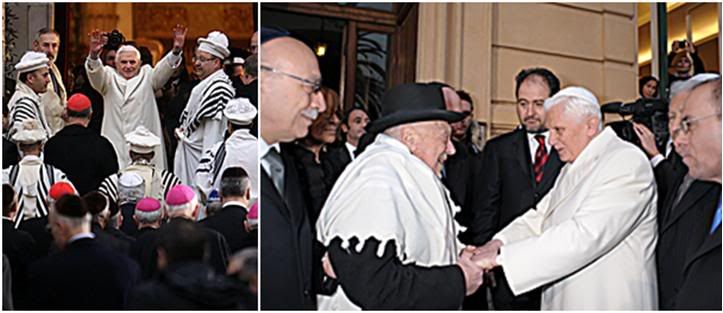

Other papal stories in this issue; The Sunday Angelus at which the Pope asked for prayers in behalf of Haiti,
migrants, dialog with the Jews, and Christian unity; and his meeting yesterday with representatives of the
Lutheran Church of Finland. Other Page 1 stories: Continuing coverage of the 'unprecedented disaster' in Haiti.
No scheduled events today for the Holy Father.
Reminder from

Monday, January 25
17:30 Basilica of St. Paul outside the Walls
VESPERS PRESIDED BY THE HOLY FATHER
SOLEMNITY OF THE CONVERSION OF ST. PAUL
Conclusion of the Week of Prayer for Christian Unity
At a news conference today, the Secretariat of the Bishops' Synod presented the Lineamenta (general guidelines)
for the Synod's Special Assembly for the Middle East to be held at the Vatican in October.
MONTHLY 'ANNIVERSARY'


FOUR YEARS, NINE MONTHS, AND COUNTING....
AD MULTOS ANNOS, SANCTO PATER!
THANK YOU FOR ALL YOU ARE
TO THE CHURCH, TO THE WORLD, TO ALL OF US.

|
| |
 19/01/2010 16:25 19/01/2010 16:25 |
|
| | | OFFLINE | | Post: 19.307
Post: 1.948 | Registrato il: 28/08/2005
Registrato il: 20/01/2009 | Administratore | Utente Veteran | |
|


 Vittorio Messori offers this very moving reflection on Jewish-Christian relations that is way off the media's beaten path, and for good reason.
Between Jews and Christians:
Vittorio Messori offers this very moving reflection on Jewish-Christian relations that is way off the media's beaten path, and for good reason.
Between Jews and Christians:
A family quarrel - and a mystery
by VITTORIO MESSORI
Translated from

January 19, 2009
These days, torrents of words are gushing forth about the visit of Benedict XVI to the Rome Synagogue, erected there where the Jewish Ghetto arose, oriented along the Tiber almost as though in a direct challenge to the largest Basilica in the world, built over the tomb of one Simon of Galilee.
A pious Jew, he was, an obscure fisherman on the Lake of Galilee, who was renamed Kephas - Peter, the rock - by one Jesus of Nazareth, someone who, historically, was just another itinerant Jewish preacher in the time of the Second Temple, one of so many who claimed to be the Messiah awaited by Israel. In short, the usual fanatic, apparently visionary.
And one who was punished with the most shameful of deaths, reserved only for slaves. A life which may have been lost to oblivion, had not his followers - all circumcized Jews faithful to the Torah - started to proclaim, with intrepid hardheadedness, that the rabbi who ended up crucified, had risen from the dead and was truly the Anointed One, the Christ, pre-announced by the prophets.
That small band of Jews succeeded to convince other Jews, first in Jerusalem, and then in the synagogues of the Diaspora, where they went in order to announce that Israel's millennial wait had been fulfilled.
The best presentation to his fellow Jews was made by an enthusiastic believer, another son of Abraham, Saul who would be called Paul, who, in order to make things clear, immediately informed them that he had been "circumcized on the eighth day, an Israelite, from the tribe of Benjamin, a Jew, and son of Jews".
He, too, like Peter, ended up killed by the pagan rulers of Rome, and over his tomb, too, a giant basilica was built.
If, from all Europe, during all the MIddle Ages, crowds of pilgrims came chanting psalms and in penitence to the city on the Tiber, it was to venerate the tombs of those two 'pillars of the faith' - both of them Jewish to the very marrow.
In the long run, the pagans did not bother to distinguish among the Jews, dividing them into one group who had added that exotic Christ to their faith, and those who rejected Christ. They considered such distinction as nothing more than boring internal disputes, theological quarrels such as frequently seen in any religion.
Benedict XVI, I read in one account, had a small Bible with him which he left in the car when he got off in the Jewish quarter. Well, of the 73 books that make up the text on which the faith of the Church is founded, only Luke, and perhaps Mark, among the authors, were not sons of Israel.
These days, there is a preference to replace the designations 'Old' and 'New' Testaments with 'First' and 'Second' Testaments, in order to underscore the continuity and homogeneity of the Biblical message.
But why are we recalling all this, and much more which we could add? Why do so many commentators, especially these days, seem to forget that what we have here is a family history which is also a religious mystery?
It is a story of faith, and faith alone. And the secular layman can only see - and often, in a misleading way - its external contours.
This is a confrontation among the sons of Abraham, sons by birth or by adoption. This 'familial' aspect explains the harshness that has been present on both sides: the Acts of the Apostles and Paul's Letters show how severe the reaction was to the Christian 'heretics' from official Judaism.
And who does not know that the harshest differences are those between close kin, and that the most fearful wars are civil? 'Fratelli, coltelli'! [an Italian saying which means, "Brothers = daggers drawn].
For two thousand years, Christianity has been the faith of billions by now in a Messiah of Israel announced and awaited for two thousand years before he was born, by the people of Israel who did not all - some did and were the first Christians - recognize him when he came.
For the nth time, the analyses and opinions expressed these days generally do not seem to be aware that the question of Jewish-Christian relations goes beyond the categories of history, of politics, of culture.
The relationships within the Judaeo-Christian world are not 'problems' that can be faced with the usual categories: they are - and let us call it so - a Mystery.
A word used by Saul/Paul, in his letter to the Romans: "I do not want you to be unaware of this mystery, brothers, so that you will not become wise (in) your own estimation: a hardening has come upon Israel in part, until the full number of the Gentiles comes in, and thus all Israel will be saved, as it is written" (11,25-26).
In any case, even those who are 'hardened', are "beloved because of the patriarchs. For the gifts and the call of God are irrevocable" (11,28-29).
The knowledge of political analysts and intellectuals is completely inadequate in this respect - the limited knowledge of those who are not aware that the confrontation between Jews and Christians does not belong to history but to the theology of history.
Solvitur in Excelsis! - it can be solved at the highest level. This is an enigma, too often painful, which can be explained only in Heaven, to echo the words of that great philospher and great Christian Jean Guitton.
If I were a Jew, I too might ask myself every day - how is it that an original band of Twelve Jews were able to spread a message so powerful and convincing that even early on, the faith they founded on the person of a fellow Jew who was unique to them for being the Son of God, far outgrew the faith they had been born in? Why are there 1.2 billion Catholics (and possibly 2 billion Christians in all) today, compared to 14 million Jews? {Not forgetting that when Cardinal Ratzinger was once asked what made him so certain of Christian hope, he replied, "The lives of the saints, and the survival of the Jewish people".]
Before Benedict XVI revised the Good Friday prayer for the Jews, I had no occasion to read Paul's Letter to the Romans. And not having been particularly interested in the Bible before getting to 'know' Benedict XVI, I was not aware that 'Romans' is considered Paul's masterpiece, his most important theological legacy, "a work of massive substance, presenting a formidable intellectual challenge while offering a breathtaking theological and spiritual vision".
Its subject has been described as "the gospel of the justification and salvation of Jew and Greek alike by the grace of God through faith in Jesus Christ, revealing the uprightness and love of God the father".
But Paul presents his teaching from the point of view of someone who was born, raised, educated and thoroughly versed as an observant Jew, which makes his appeal to the reason of his fellow Jews to accept Christ extraordinarily powerful. Even a cursory reading of it brings a vivid thrill as though one were actually listening to him!(Forgive the enthusiasm of a newbie who has little acquaintance with the Bible!)
I had thought I had cried enough sentimental tears while reading and translating Vittorio Messori's piece. Then along comes this essay by the Spanish journalist Jose Luis Restan to bring on a fresh spate, but this time for his remarkably empathetic approach of reporting the visit to the synagogue as it might well have been, at least in part, from the point of view of the Holy Father.
Shalóm for always
by José Luis Restán
Translated from

January 19, 2010
In 2,000 years, only two Popes have entered a synagogue in Rome.
One was Polish, among whose classmates and playmates there had been many Jews, some of whom remained his friends until he died.
The other is German, from the same land that gave rise to that terrible ideology that sought to extirpate the sons of Abrhaam from the face of the earth.
Last Sunday, Papa Ratzinger wrote a new page in history when he came to the Rome Synagogue as the humble successor of the Jew, Peter of Galilee.
He came and looked around with those kind but penetrating, almost childlike eyes. He looked around, knowing full well that somehow, even if unjustly, a big part of the atavistic resentments in the Jewish world against the Catholic Church is laid on his person.
He, who has devoted his best intellectual energies to profoundly examining the Jewish root of the Christian faith, who more than anyone else has scrutinized the venom of Nazi ideology - he is aware that he will stir up all the bugbears, [if only because he is German!], especially after revoking the excommunication of the bishops ordained by Mons. Lefebvre, and after promulgating the heroic virtues of Pius XII.
He knows that every line of his address would be scrutinized under a magnifying glass - but he is not one to indulge in petty considerations. He deals with an open heart.
He knows that this moment was not made possible by human maneuvers and wiles, but by the Hesed of God, his mercy which established a history in which Jews and Christians cannot be without each other.
First was his silent homage to the victims of the Shoah: as in Auschwitz, and as in Yad Vashem. "How can we forget the tears and desperation of those men, women and children, their faces, their names?"
When, in the Synagogue, a few survivors of the Holocaust from the Rome ghetto were presented to him, he rose to his feet and applauded them. It was a gesture that broke the ice of ages. Some of the survivors broke into tears, but this time, of joy.
Benedict repeated to them what he had said in Auschwitz: "The rulers of the Third Reich wanted to crush the entire Jewish people”, and, essentially, “by wiping out this people, they intended to kill the God who called Abraham, who spoke on Sinai and laid down principles to serve as a guide for mankind, principles that remain eternally valid".
He also underscored the sorrow of the Church about her own children who, through their failings, had provoked the wounds of anti-Semitism and anti-Judaism, and asked that such wounds may be healed for always.
He knew that they expected him to refer to the wartime actions of Pius XII and the Church with regard to the Nazi persecution of the Jews, and he did not dodge it.
"Many, including Italian Catholics, sustained by their faith and by Christian teaching, reacted with courage, often at risk of their lives, opening their arms to assist the Jewish fugitives who were being hunted down, and earning perennial gratitude. The Apostolic See itself provided assistance, often in a hidden and discreet way".
He would not stir up new controversy, but stated, freely and humbly, what the Church considers to be the right thing.
And now, the Pope could enter into that which is close to his heart: the common legacy, drawn from the Law and the Prophets, which establishes the link between the Church and the Jewish people at the level of their very identity.
He focuses his reflection on the Ten Commandments, "a guiding star of faith and morals for the people of God, and also enlightens and guides the path of Christians", and "a great code of ethics for all humanity".
He states that the Decalogue could lead to many fields of collaboration and common witness for Catholics and Jews: re-awaken an openness to the one God in a society that is making new golden calves; to protect human life against all injustice and abuse; to promote the sanctity of the family based on the reciprocal Yes of a man and a woman.
And he recalls that "all of the Commandments are summed up in the love of God and loving-kindness towards one’s neighbor" and "urges Jews and Christians to exercise, in our time, a special generosity towards the poor, towards women and children, strangers, the sick, the weak and the needy".
He ends by invoking the same 'Shalom' that he had written in the note he left at the Wailing Wall in Jerusalem last May: “Send your peace upon this Holy Land, upon the Middle East, upon the entire human family; stir the hearts of those who call upon your name, to walk humbly in the path of justice and compassion.”
And so, evening fell on the eternal city which has seen Christians and Jews together for two thousand years. As testified to by the exhibit of Jewish designs showing their participation in the coronation of the 18th-century Popes, inaugurated by Benedict XVI and Rabbi Di Segni at the Jewish Museum of Rome.
But perhaps never before have the Jews and Christians of Rome looked at each other, recognizing each other as brothers, as they did on Sunday. SHALOM!
I like Riccardo Pacifici's definition of Shalom, in an interview he gave soon after the Pope's visit, saying Shalom was "the last of the Berakha (Benedictions), which indicates the highest and purest aspiration, namely, spiritual integrity and serenity in one's perfect consciousness of God".
[Modificato da TERESA BENEDETTA 20/01/2010 02:28] |
| |
 19/01/2010 18:54 19/01/2010 18:54 |
|
| | | OFFLINE | | Post: 19.308
Post: 1.950 | Registrato il: 28/08/2005
Registrato il: 20/01/2009 | Administratore | Utente Veteran | |
|


 Here's the best-written news report I have seen so far of the Pope's Synagogue visit - surprisingly from a Jewish news agency. It avoids most of the media pitfalls, to begin with, and, except for a surprising failure to mention the 'Ten Commandments' part of the Pope's address [maybe the paragraph was dropped in posting?], it does not miss the main points even if it is rather concise. Plus, it reports a very beautiful insight by Rabbi Arthur Schneier of New York.
Pope seeks to mend ties
Here's the best-written news report I have seen so far of the Pope's Synagogue visit - surprisingly from a Jewish news agency. It avoids most of the media pitfalls, to begin with, and, except for a surprising failure to mention the 'Ten Commandments' part of the Pope's address [maybe the paragraph was dropped in posting?], it does not miss the main points even if it is rather concise. Plus, it reports a very beautiful insight by Rabbi Arthur Schneier of New York.
Pope seeks to mend ties
in Synagogue visit
by Ruth Ellen Gruber

ROME, Jan. 19 (JTA) - When Pope Benedict XVI visited this city’s main synagogue, sparring between the pope and Jewish leaders over Pope Pius XII’s role in the Holocaust grabbed headlines.
But the emotion-charged visit Sunday held broader significance, as Jewish leaders and the German-born pontiff sought to mend strained relations and reaffirm a commitment to Christian-Jewish dialogue.
“Despite a dramatic history, the unresolved problems and the misunderstandings, it is our shared visions and common goals that should be given pride of place,” said Rome’s chief rabbi, Riccardo Di Segni, speaking to a packed sanctuary from in front of the ornate ark. “The image of respect and friendship that emanates from this encounter must be an example for all those who are watching.”
Benedict’s visit came in the wake of tensions sparked most recently by his decision last month to move Pius XII closer to sainthood. A year ago, the Pope triggered an outcry by revoking the excommunication order on a traditionalist bishop who has denied the Holocaust.
Critics accuse Pius of having turned a blind eye to Jewish suffering in the Holocaust. Rabbi Giuseppe Laras, the president of the Italian Rabbinical Assembly, boycotted the synagogue ceremony to protest Pope Benedict’s move on Pius.
Rome Jewish Community President Riccardo Pacifici, whose grandparents died in Auschwitz, acknowledged the concern over Pius in his welcoming address to the Pope and repeated calls for the Vatican to open its secret archives to resolve the issue.
But he also paid tribute to individual Catholics and Catholic institutions that had helped Jews—and choked back tears describing how his father and uncle had been saved in a Catholic convent.
“Because of this, the silence of Pius XII in the face of the Shoah still hurts like a missed opportunity,” Pacifici said. “Maybe he could not have stopped the death trains, but he could have sent a signal, a word of extreme comfort, of human solidarity, for our brothers who were transported to the ovens of Auschwitz.”
Benedict in his speech minutes later did not mention Pius by name but implicitly defended him, repeating the stance that the Vatican had “provided assistance, often in a hidden and discreet way.”
The main focus of Benedict’s speech, however, was a reaffirmation of commitment to the Jewish-Catholic dialogue launched by the Second Vatican Council’s Nostra Aetate declaration of 1965 and fostered by his predecessor, Pope John Paul II.
The visit took place on the day marked by the Catholic Church as an annual Day of Dialogue with Judaism.
Memory of the Holocaust, the 82-year-old Pope said, “compels us to strengthen the bonds that unite us so that our mutual understanding, respect and acceptance may always increase.”
Benedict repeated John Paul’s prayers for forgiveness for Catholic anti-Semitism.
“The Church has not failed to deplore the failings of her sons and daughters, begging forgiveness for all that could in any way have contributed to the scourge of anti-Semitism and anti-Judaism,” he said. “May these wounds be healed forever!”
Benedict’s words were interrupted by applause several times and drew a standing ovation from an audience that included Jewish, Catholic and Muslim representatives, Holocaust survivors, political leaders and the 100-year-old Nobel Prize-winning scientist Rita Levi Montalcini, who was persecuted under fascist Italy’s World War II-era anti-Semitic laws.
The two-hour visit was only the second time a Pope had visited the synagogue, a towering structure on the bank of the Tiber River in the old ghetto area where Roman Jews were forced to live until 1870.
Rome’s Jews form the oldest continuous Jewish community in the western Diaspora. John Paul II’s visit in 1986 was a milestone in Catholic-Jewish dialogue.
Before entering the synagogue, Benedict, an unwilling member of the Hitler youth organization as a teenager, placed a wreath at a memorial plaque honoring the more than 1,000 Roman Jews who were deported to Auschwitz in 1943. He also placed a wreath at a plaque honoring a toddler killed in a 1982 Palestinian terrorist attack on the synagogue that wounded scores of worshipers.
“We live in a world of symbolism, and his going to synagogue was a very symbolic statement,” said Rabbi Arthur Schneier, the founder and president of the Appeal of Conscience Foundation.
Schneier said the Pope was attempting to bolster a template for a world in which the Holocaust generation was passing and the epicenter of Catholicism was shifting to Latin America, Asia and Africa — global regions where few Jews live.
“A picture is worth 1,000 words,” said Schneier, a Holocaust survivor who hosted Benedict in 2008 at his Park East Synagogue in New York. “Think what it means to a priest in, say, a village in Bolivia to see the Pope during this visit to the synagogue. It is a message that dialogue with Judaism is on. The tracks were laid by the Second Vatican Council and the trains are running.” [Bravo and very well put, Rabbi Schneier!]
Israeli Deputy Prime Minister Silvan Shalom also attended Sunday, and he called the papal meeting “a historic moment.”
At a news conference afterward, Shalom said he also had asked the Pope to open the Vatican’s secret World War II archives.
[OK, already! What part of "They will be ready for outside researchers in 2014" is not clear to y'all? You would think the Vatican has been stonewalling on the request!
Meanwhile, how about a serious commentary by some Jewish scholar on the 12-volume compilation of the relevant documents (from those still-closed archives) that the Vatican put out in the mid-60s?
Or on all the Pius XII material already available in archives that are open up to 1939, covering the Pius XI Papacy, during which Eugenio Pacelli was Apostolic Nuncio in Germany and then Vatican Secretary of State? Anything there that Pacelli was actually anti-Semitic, or that he colluded with any of the Nazi leaders?
Anyone? Or does no Jewish scholar think it worth his while to study those documents because there is no smoking gun to be found? And what new pretext will they have if, after 2014, they still fail to find a smoking gun?
Elizabeth Lev, who also writes now for the AOL news-and-commentary outlet POLITICS DAILY, has a great story that conveys the sense she was really there - as opposed to the standard news reports [on the template of the news agency wire] that all read as if they were based simply on available speech texts and watching the telecast of the event.
Additionally, of course, she articulates what was so obvious Sunday from the intial reports filed about the visit, when I commented in my post of the text of the Holy Father's address: "How deplorable it is that in the media's morbid preoccupation over its 'tension watch' in Jewish-Catholic relations, the initial reports said virtually nothing about the Holy Father's splendid, beautifully crafted, eminently sensible discourse on the essence of those relations, other than his reference to what the Vatican did in World War II! Without saying so explicitly, he also brings a whole new light to why Western civilization is said to be based on the 'Judaeo-Christian tradition'. And he spoke of Jesus a couple of times to his Jewish audience in the most natural way!..."
At Pope's trip to Rome Synagogue,
the press misses the story
by ELIZABETH LEV

ROME, Jan. 18 -- Just as the massive TV trucks parked around Rome's synagogue obscured the sight of one of the city's most beautiful buildings, so too have news reports obscured the real importance of the Pope's visit to the Jewish community here.
Late Sunday afternoon, Pope Benedict XVI made the short trip across the Tiber River to the Great Synagogue of Rome, located on the site of the former Jewish ghetto. The weather was chilly, but the greetings just the opposite.
Riccardo Di Segni, chief rabbi of Rome, and Riccardo Pacifici, president of the Jewish Community of Rome, welcomed the Pope on the steps of the synagogue amid thunderous cheers of "Viva il Papa!"
Benedict was accompanied by [among many other Church officials closely involved in dialog with the Jews] Archbishop Fouad Twal, the Latin patriarch of Jerusalem, and Archbishop Antonio Franco, apostolic nuncio in Israel, to underscore his encouragement of inter-religious relations by drawing Rome and Israel closer together.
Despite the trite headlines about the "Pope's Controversial Visit," there was no real controversy; the chief rabbi had extended the invitation to Benedict in 2006 and the Roman Jewish community pulled out all the stops for this event.
This was Benedict's third visit to a Jewish place of worship (after stops at the synagogues of Cologne in 2005 and New York in 2008). Pope John Paul II became the first Pope to visit the Roman synagogue in April 1986, and Benedict, following in his predecessor's footsteps, has now created a double precedent.
Future popes will now be expected to visit the synagogue, just as they do the mayor's office, Parliament and the local parishes.
As with the Pope's Holy Land trip, this visit began with an acknowledgment of the suffering of the Jewish community through the Holocaust and other violence. Benedict first placed red roses before the memorial tablets that record the roundup and deportation of 1,022 Jews on Oct. 16, 1943; he then laid a wreath beneath the plaque commemorating the Oct. 9, 1982, terrorist attack on the synagogue, which killed a 2-year-old child, Stefano Tache.
More than merely remembering hostilities by outsiders, however, Benedict took the occasion to acknowledge the turbulent history between Christian Rome and its Jewish denizens.
He chose a special date for the visit, the feast of Mo'ed di Piombo, which recalls the miraculous event of 1793 when an unexpected rainstorm put out a fire set by the Roman populace in the Jewish ghetto.
Jan. 17 is also dedicated to the Study and Development of Dialogue between Catholics and Jews, celebrating its 21st anniversary this year.
The real spirit of Benedict's visit and his encounter with the chief Rabbi was not one of recrimination but of furthering dialogue, though most major news outlets were too busy waving the red flag of WWII and Pope Pius XII to see that.
So, despite all satellite feeds streaming from the place of worship yesterday, there was no hostility, just singing and praying amid an ecstatic crowd of Muslims, Jews and Christians, all brought together in peace.
Benedict not only visited the sacred space of the synagogue but also the recently restored Jewish Museum, where numerous artifacts testify to the 2,000-year-old history and culture of the Jewish community in Rome.
For their part, officials of the Jewish Museum put together a spectacular exhibition for their visitor. Despite numerous hardships, the Jewish community managed to conserve 14 panels dating from the 18th century, made to celebrate the investiture ceremony of the popes.
Curator Daniela di Castro, who accompanied the Pope on his tour of the unique exhibits, noted that Benedict "is the first pontiff to visit a Jewish museum, just as the Jewish Museum of Rome is the first Jewish museum to be visited by a Pope. . . . Hence, it is an immense honor for our museum."
Despite all the makings of an upbeat story amid news of natural and diplomatic disasters, most journalistic accounts focused on tensions caused by Pope Pius XII's so-called "guilty silence" regarding the Holocaust, and Pope Benedict's recent recognition of the heroic virtues of this same Pope, who is on his way to sainthood.
Rabbi Yisrael Meir Lau, chief rabbi of Tel Aviv, gave marching orders to the world press when he expressed disapproval of Benedict's support of Pius XII in an interview with Italy's Sky TG24 television last week.
While the rabbi's distaste for Pius XII is a matter of public record, his historical memory has been known to be a bit foggy. He has denounced the Pontiff for silence over the violence of Kristallnacht, despite the fact that Pius was not yet Pope when the event took place in 1938.
He also seems to have forgotten that Israeli Prime Minister Golda Meir commented on death of Pius XII in 1958 by writing: "We share in the grief of humanity at the passing away of His Holiness. . . . When fearful martyrdom came to our people in the decade of Nazi terror, the voice of the pope was raised for its victims. . . . We mourn a great servant of peace."
Rabbi Lau's weak mastery of history seems to be shared by Pacifici, the president of the Jewish Community of Rome. Pacifici participated pleasantly enough in Sunday's festivities, but couldn't resist a dig -- undoubtedly prompted by the multitude of TV cameras -- when he referred to the supposed silence of Pope Pius XII as a "missed opportunity."
Pius XII's actions are known to have spoken louder than his words. Gary Krupp, the Jewish founder of the Pave the Way Foundation, has dedicated the last eight years to collecting video testimony and archival evidence that demonstrate the direct action of Pope Pius XII in saving hundreds of thousands of Jewish lives by issuing false baptismal certificates, obtaining visas for refugees and ordering religious houses and parishes to hide Jews.
Pacifici is the first to thank the religious sisters of St. Marta in Florence, who saved him during the war, but he doesn't recognize that they, like hundreds of other convents in Italy and Germany, were acting under Pius's direct orders.
Emilio Zolli, the chief rabbi of Rome during the German occupation, however, knew well of Pius's role. After the war, Zolli converted to Catholicism and took Pius's baptismal name, Eugenio.
In his biography, Before the Dawn, Zolli wrote: "No hero in all of history was more militant, more fought against, none more heroic, than Pius XII in pursuing the works of true charity."
Simple enough information for any journalist to research, but in this case, the press maintained a guilty silence of its own. The New York Times even forgot its own history.
On Dec. 25, 1942, it published an editorial saying, "The voice of Pius XII is a lonely voice in the silence and darkness enveloping Europe. . . . He is about the only ruler left on the Continent of Europe who dares to raise his voice at all."
Instead of puzzling over whether Pius XII could have done more for the Jews, maybe we should be asking who did more?
I am glad Lev was able to include some of the more striking testimonials about Pius XII as a real 'righteous among the people' in her story. There are quite a few more from Jews who spoke out between 1943 and 1958, the year of Pius XII's death - all of which have been consigned to oblivion in one fell swoop by his detractors. And yet, it should almost be obligatory for any conscientious journalist writing a news report or commentary about Pius XII's wartime actions to insert the information as a convenient ast-a-glance reference! (Except it would easily double the wordage of the original story).
The sad fact is that Pius XII's detractors - Jewish and Christian - will not even acknowledge he did anything positive at all. For them, none of the possibly tens of thousands of Jews sheltered by Catholic institutions from their Nazi hounds counts at all, because he was 'silent'!
It is a perversion of reason and common sense that has no rational explanation. Or only a psychiatric one. Perhaps if I took the time, I might be able to see how Rene Girard's scapegoat mechanism and theory of victimization applies in this Jewish compulsion to displace all their frustrations and resentments over the Shoah onto Pius XII - a convenient scapegoat not only because he is such a towering figure in history, but better yet, he is also Catholic.
They are hitting two birds with one stone - assigning guilt for the Holocaust to Pius XII and the Church - while in the process, almost completely forgetting the real culprits, Hitler and Nazism.
[Modificato da TERESA BENEDETTA 19/01/2010 21:01] |
| |
 19/01/2010 22:37 19/01/2010 22:37 |
|
| | | OFFLINE | | Post: 19.309
Post: 1.951 | Registrato il: 28/08/2005
Registrato il: 20/01/2009 | Administratore | Utente Veteran | |
|
 I was wondering whether we would ever get a story about the Pope's audience yesterday with Rabbi Jacob Neusner - and here we have tomorrow's issue of OR with a great story! I am going to alter the 'order' of the story which begins with discussing the occasion for which Rabbi Neusner came to Italy - a public discussion on Monday evening in a Rome auditorium with Mons. Bruno Forte, a leading Italian theologian, about the Sermon on the Mount. Monday morning, Neusner and his wife met with the Pope at the Vatican, and before that, they were at the Rome Synagogue on Sunday afternoon for the Pope's visit.
The Pope and Rabbi Neusner:
I was wondering whether we would ever get a story about the Pope's audience yesterday with Rabbi Jacob Neusner - and here we have tomorrow's issue of OR with a great story! I am going to alter the 'order' of the story which begins with discussing the occasion for which Rabbi Neusner came to Italy - a public discussion on Monday evening in a Rome auditorium with Mons. Bruno Forte, a leading Italian theologian, about the Sermon on the Mount. Monday morning, Neusner and his wife met with the Pope at the Vatican, and before that, they were at the Rome Synagogue on Sunday afternoon for the Pope's visit.
The Pope and Rabbi Neusner:
He says he's finished JESUS Vol. 2
and the rabbi thinks Pope's
Synagogue visit was 'great'
by Andrea Monda
Translated from
the 1/20/10 issue of

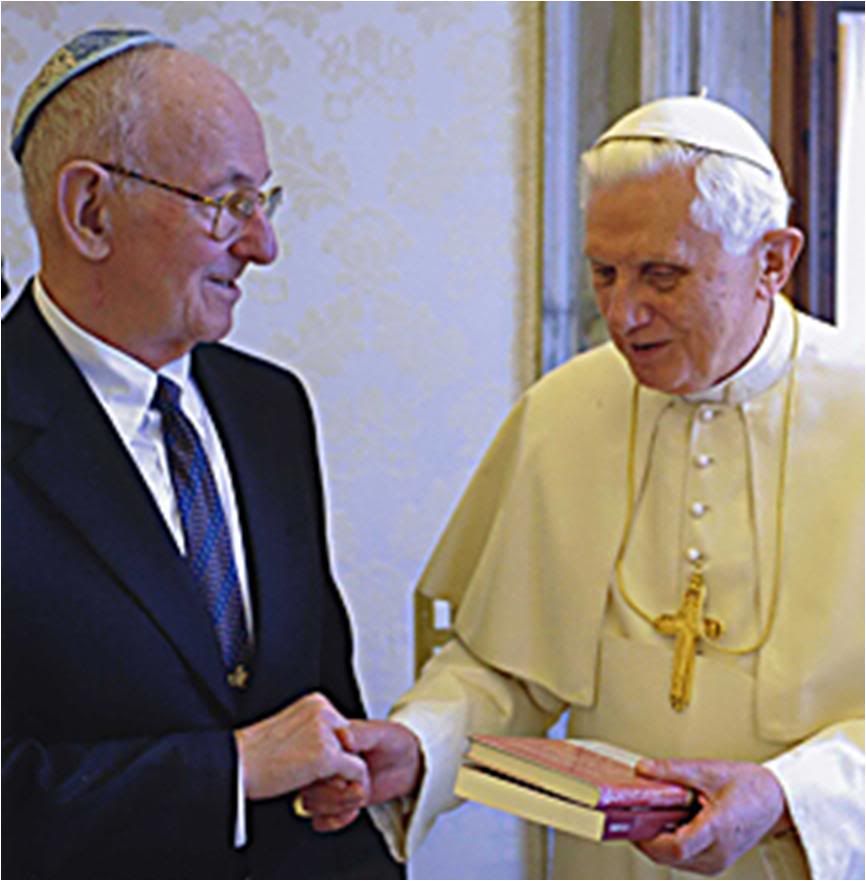
Rabbi Jacob Neusner and his wife Suzanne were received by Benedict XVI Monday morning at the Vatican in a private audience.
The rabbi presented the Pope with a German edition of Neusner's 1993 book A Rabbi Talks to Jesus which Cardinal Ratzinger had read in its original English edition, as well as the Italian edition of a book on the Talmud by Neusner [author of more than 900 books].
Neusner says they talked for about 20 minutes. "Enough time for a beautiful encounter between two professors. I have always admired the scholar Joseph Ratzinger for his honesty and lucidity, and I really looked forward to meeting and getting to know him. Because I came to Rome for his historic visit to the Synagogue and for the event with Mons. Forte, it was a great gift that I was able to have this audience."
[NB: The two first met briefly in Washington, D.C. during the Pope's visit to the USA in April 2008, at his meeting with Jewish representatives.]
The rabbi could hardly contain his joy at the occasion: "We spoke of our books, and he told me he has finished writing the second volume of JESUS OF NAZARETH".
But Neusner is also someone who goes straight to the essential. "What struck me most are his penetrating eyes. He is able to look into you and through you. And then, of course, his gentlemanly manners, full of kindness and humility."
He found these human traits most appealing about the Pope, the same traits he saw during the Pope's visit to the Rome Synagogue.
"It was a magnificent event, with such enormous participation, which was moving for everybody, and which makes me hopeful about the future. The problem today - which the Pope understands well - is that we live in a sort of oblivion, forgetting history and our religious traditions. That is why the study of history is so important.
"I think, for instance, of the historical figure of Pius XII. I think it is still too early to say, and yet, we often hear cutting judgments, one way or the other. I have the odd sensation that there seems to be a force acting destructively that is not interested in Catholicism nor in Judaism, much less in dialog between the two great traditions.
"It is sad, because in fact - and I see this in daily life in the United States - relationships between individual Jews and Christians are excellent.
"If we ignore the past, we are condemned to relive it. So studying the past, from this viewpoint, is essential - along with a sense of responsibility. Every generation is responsible for the future, and we have that responsibility today, here and now."
The following is how the article begins:
There was no person more appropriate than Rabbi Jacob Neusner - one of the best connoisseurs and scholars of Judaism living today - to dialog with the Archbishop and theologian, Mons. Bruno Forte, about the Sermon on the Mount.
Their exceptional discussion was held Monday evening at the Sala Petrassi of the Auditorium on Via della Conciliazione. It was not by chance that it was held the day after the Pope's visit to the Synagogue of Rome. Nor was the choice of Rabbi Neusner random.
He was invited specially by the Fondazione Marilena Ferrari-FMR in connection with an event called Imago Christi, which is also the title of an art book edited by Nicola Sapori illustrating the Sermon on the Mount, which was read on the occasion by Italian actor Luca Zingaretti.
"Thanks to this text {the Sermon}, I learned to love Jesus," Mahatma Gandhi famously said, as Mons. Forte recalled in his opening remarks, describing the Beatitudes as an 'identity card' of Jesus, and therefore, the ideal for every Christian.
And no one could be better than Rabbi Neusner to offer his reflections as a Jew on the Sermon, because he has been doing it for almost twenty years, in effect, since he began a long-distance dialog with Cardinal Joseph Ratzinger.
In 1993, Neusner published the book A Rabbi Talks with Jesus, in which he imagines that he was present when Jesus gave the Sermon, and reflects on it as if he was really hearing it for the first time.
And he sought to listen to the Sermon without being influenced by any of the prejudices and interpretations that had accumulated in the 2000 years of Christianity.
Rabbi Neusner recounted this about its first publication: "Before it was to be published, I went to my editor, asking him what he thought of using in the book jacket a review from Cardinal Ratzinger, who was the Prefect of the Congregation for the Doctrine of the Faith. He thought I was mad and said the cardinal would never even think about it."
"We made a bet, and I won. Among other things, Ratzinger called my book 'the most important document for Jewish-Christian dialog that has come out in the past decade'. He also said, 'The absolute intellectual honesty, the precision of analysis, its respect for the other side, joined to a radical loyalty to his own position, characterize this book and make it a challenge, especially for Christians, who should reflect well on the contrast between Moses and Jesus'.
"Then, when Benedict XI wrote the first volume of JESUS OF NAZARETH in 2007, he did me the great courtesy of resuming our dialog by dedicating quite a few pages to my 1993 book".
Mons. Forte is well-acquainted with Neusner's book, praising it several times during the public discussion, underscoring its originality, which "lies in the fact that the author imagines himself to be a contemporary of Jesus, with whom he enters into an intensive discussion."
"In the rabbinical tradition," Mons. Forte said, this is an act of profound respect and great spiritual tension."
The bishop also praised the frankness and loyalty to Jewish tradition with which it is written: "Jesus's Jewishness is not put to question, and one must be grateful to those like Neusner who show him honesty and respect".
But with similar frankness, Mons. Forte presented the tenets of Christianity, dwelling on the point which the Rabbi found most questionable about Jesus: whether Jesus meant his teaching to supersede the Torah.
Citing Jeremiah, Forte said the Sermon on the Mount was not a law set against Mosaic law, but a Gospel, the good news about the love of God who never abandons man, and incarnated in Christ, gives man the strength to reach the apparently impossible ideals expressed in the Beatitudes, Christianity's Magna Carta.
The most fascinating aspect of the discussion between the two theologians was its authenticity: kind and courtly in manner, but frank and open in substance - a genuine confrontation which, in the context of current efforts at dialog between Jews and Christians, contributes to improve their knowledge of one another.
[Modificato da TERESA BENEDETTA 19/01/2010 22:38] |
| |
 19/01/2010 23:42 19/01/2010 23:42 |
|
| | | OFFLINE | | Post: 355
Post: 6 | Registrato il: 17/05/2006
Registrato il: 02/05/2009 | Utente Comunità | Utente Junior | |
|
Re: Rabbi Neusner and Pope So glad the two could meet again! And now we know that Jesus of Nazareth, Part II, is finished and hopefully on its way to us in a few months time.
Thank you also for all the translations of Italian reactions to the Pope's visit to the Roman synagogue, Teresa. The man who wrote about this visit from the German Joseph Ratzinger/Benedict XVI's possible personal perspective has to be lauded. Benedict XVI's courage never ceases to amaze me. The fact that he is a German who lived in the Third Reich and has now constantly to "atone" for the sins of those Nazi bastards who had slipped out of this life by means of cowardly suicide, is just breathtaking in its irony and unfairness.(Reminds me of "...the sins of the fathers.....etc.", except that his father was not even a Nazi!)
I am so glad that this Rome synagogue visit went so well - on the whole.
 AMEN to that, Mags! I must admit I have been leery of Rabbi Di Segni in the past two years, for his prompt Pavlov-dog reactions to any action or statement by the Pope that the Jewish faultfinders can use for Pope- and Catholic-bashing. But I appreciated it that he promptly came out with a statement last month after the Pius XII decree was signed, to say that it was not going to affect the Synagogue visit by the Pope. And he was also a good host last Sunday - except for the line in his remarks about 'the silences of man' that will be judged, implying that other men would be the judge...
AMEN to that, Mags! I must admit I have been leery of Rabbi Di Segni in the past two years, for his prompt Pavlov-dog reactions to any action or statement by the Pope that the Jewish faultfinders can use for Pope- and Catholic-bashing. But I appreciated it that he promptly came out with a statement last month after the Pius XII decree was signed, to say that it was not going to affect the Synagogue visit by the Pope. And he was also a good host last Sunday - except for the line in his remarks about 'the silences of man' that will be judged, implying that other men would be the judge...
As for all the unfairness and opprobrium laid on the Holy Father, I calm myself down - after I have discharged my outrage in a post - by imagining that as the Pope, and as Joseph Ratzinger, holy man, he can deal with it far better and in a different way than we ordinary mortals can. That even if in his pricate persona, he may feel hurt, anger, disappointment, etc., his personal holiness can overcome all that is negative rather fast and fully.
If he just thinks of the faithful who flock to him for the audiences and Angelus, it should more than make up for all the asses and evil men who calumniate him. And as long as we the faithful pray for him constantly, he will have that much more strength to deal with the 'slings and arrows of outrageous fate'. Also, we can trust that God is with him always because after all, he is his Vicar on earth.
AD MULTOS ANNOS, SANCTE PATER!
Teresa
[Modificato da TERESA BENEDETTA 20/01/2010 05:51] |
| |
 20/01/2010 07:15 20/01/2010 07:15 |
|
| | | OFFLINE | | Post: 19.310
Post: 1.952 | Registrato il: 28/08/2005
Registrato il: 20/01/2009 | Administratore | Utente Veteran | |
|
 I am posting this here temporarily....
Pius XII miracle reported:
I am posting this here temporarily....
Pius XII miracle reported:
Strange link to John Paul II
by Andrea Tornielli
Translated from

January 19, 2010
A supposed miracle has been attributed to the intercession of Pius XII which could lead to his beatification sooner than expected. The miracle is mysteriously tied to John Paul II.
Both Popes were proclaimed Venerable by Benedict XVI last December 19 after decreeing their 'heroic virtues' as approved by the Congregation for the Causes of Saints.
The miracle involves the unexplained healing overnight of a young mother who was diagnosed with a malignant lymphoma, and is being presented to the Vatican by the Diocese of Sorrento-Castellamare di Stabia where the woman lives.
This was first reported by the online site PETRUS with a confirmation from the Vicar of the Diocese, and Il Giornale has since reconstructed the story, which will be examined in the next several months.
In 2005, shortly after the death of Papa Wojtyla, a young couple was expecting their third child. The pregnant woman, a teacher, felt strong pains early in the pregnancy which the doctors could not explain. After several tests and a biopsy, they determined she had Burkitt's lymphoma, an aggressive cancer of the lymphatic tissues, that begins in the jawbone then diffuses to the abdomen and pelvis, and then attacks the central nervous system.
The husband started praying to John Paul II to ask for his intercession. One night, he saw the Pope in a dream. "He looked serious and he said, 'I cannot do anything now. You must pray to him' and I saw an image of a spare, lean and tall priest. I had no idea who he was".
A few days later, when he was leafing through a magazine, he saw a picture of the young Eugenio Pacelli. It was the image he had seen in his dream. And so, he set in motion a chain of prayers by everyone he knew to seek the intercession of Pius XII.
His wife was cured after the first treatment she underwent. It was so unusual that her doctors thought they must have made a srong diagnosis. But a review of her entire medical chart confirmed the accuracy of the diagnosis.
The tumor disappeared, the woman got well, went on to deliver her baby, and is back teaching.
She allowed some time to pass before she decided to report her case to the Vatican.
Fr. Carmine Giudici, vicar-general of the woman's home dioeces, told PETRUS: "It is true. We were then contacted by the Holy See informing us that a diocesaan member had claimed to be the beneficiary of a miracle thanks to Pius XII. Archbishop Felice Cece decided to convene the appropriate diocesan tribunal for such matters."
The tribunal will be responsible for evaluating the case initially and make a first determination. If they find that the claimed miracle appears plausible and is unexplained by the doctors, then they will hand the dossier up to the Vatican.
At the Congregation for the Causes of Saints, it will first be studied by a team of medical specialists to certify that a cure did indeed occur, and that how it happened was unexplainable by medical knowledge.
If these experts approve the miraculous nature of the event, the case must then pass a commission of theological experts, which will endorse it eventually to the full membership of the Congregation (cardinals and bishops).
The Pope will not get any file on the case until after the candidate for beatification has successfully passed these three levels of scrutiny at the Congregation.
The institution of a diocesan tribunal and the eventual receipt of supporting documentation in the Congregation which monitors various proceeses for beatification and canonizations in progress, does not constitute any recognition, but only that the cause for the candidate has been judged worthy of interest and follow-up.
It is therefore premature to speculate on how the cause for papa Pacelli will progress, much less, on a possible date for his eventual beatification.
What was striking about the story from Sorrento was the role played by John Paul II, almost as though he wished to help advance the cause of his predecessor.
The Vatican learned about the supposed miracle only a few days before the Pope declared Pius XII and John Paul II Venerable.
I hope God, in his divine justice, sees fit to make a Jew the beneficiary of Pius XII's canonization miracle!
[Modificato da TERESA BENEDETTA 20/01/2010 07:19] |
| |
 20/01/2010 13:17 20/01/2010 13:17 |
|
| | | OFFLINE | | Post: 19.311
Post: 1.953 | Registrato il: 28/08/2005
Registrato il: 20/01/2009 | Administratore | Utente Veteran | |
|
The perverse mindset of the MSM can best be illustrated by their outrageous saturation coverage of the release from prison of Ali Agca, who tried to kill John Paul II. Yahoo's Papacy and Vatican news photos yesterday posted 55 pictures on the event - easily more than twice the pictures they filed for Benedict XVI's visit to the Synagogue of Rome.
Why are they making such a big fuss over someone who is clearly out to exploit his notoriety? Does anyone really care what he does now? He should be just another ex-con.
He failed to kill the Pope - that was the only important thing in 1981. Period. God forbid they let him anywhere near Benedict XVI!
|
| |
 20/01/2010 14:46 20/01/2010 14:46 |
|
| | | OFFLINE | | Post: 19.313
Post: 1.955 | Registrato il: 28/08/2005
Registrato il: 20/01/2009 | Administratore | Utente Veteran | |
|
 Wednesday, January 20
Wednesday, January 20
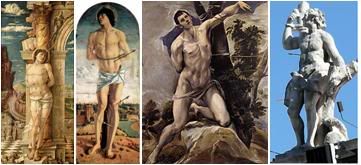 From left: Paintings by Mantegna, Bellini, El Greco, and a statue in St. Peter's colonnade.
ST. SEBASTIAN (Italy, ?257-288), Martyr
From left: Paintings by Mantegna, Bellini, El Greco, and a statue in St. Peter's colonnade.
ST. SEBASTIAN (Italy, ?257-288), Martyr
Nothing is historically certain about St. Sebastian except that he was a Roman
martyr who was venerated in Milan even in the time of St. Ambrose, and was
buried on the Appian Way, near the Catacombs that bear his name. Devotion
to him spread rapidly, and he is mentioned in martyrologies as early as 350 AD.
The legend of St. Sebastian became a popular subject in art. The familiar image
of the saint pierced by arrows comes from the story that under Diocletian, he
was exposed as an impostor in the Roman army and sentenced to be shot to
death by archers. He survived to continue denouncing persecution of Christians
to the emperor himself. He was clubbed to death.
Readings for today's Mass: www.usccb.org/nab/readings/012010.shtml
OR today.
 Papal stories in this issue are in the inside pages - the text of the Pope's extemporaneous address to the delegation from Freising which was at the Vatican Saturday to confer him with honorary citizenship (center photo shows the Holy Father with Archbishop Wetter (left) and Archbishop Marx, the two men who have succeeded him so far as Archbishop of Munich-Freising; archive photo shows the seminarian Joseph Ratzinger in Freising after the war), and his meeting with Rabbi Jacob Neusner (translated and posted on this page yesterday). Page 1 stories: Logistical problems hamper getting aid to Haiti earthquake victims; an article on the Church in the Holy Land, in connection with the presentation yesterday of the Lineamenta for the Synodal Assembly on the Middle East in October; and weak signs of recovery for Europe which lost 4.5 million jobs last year. In the inside pages, an article by the Israeli ambassador to the Holy See calling on Orthodox Jews to accept dialog with Christians; an essay by Mons. Bruno Forte about Catholic teaching on the environment, delivered at the joint meeting of the Vatican-Israeli theological commission; and a summary of activities in the Oriental Catholic Churches in 2009.
THE POPE'S DAY
Papal stories in this issue are in the inside pages - the text of the Pope's extemporaneous address to the delegation from Freising which was at the Vatican Saturday to confer him with honorary citizenship (center photo shows the Holy Father with Archbishop Wetter (left) and Archbishop Marx, the two men who have succeeded him so far as Archbishop of Munich-Freising; archive photo shows the seminarian Joseph Ratzinger in Freising after the war), and his meeting with Rabbi Jacob Neusner (translated and posted on this page yesterday). Page 1 stories: Logistical problems hamper getting aid to Haiti earthquake victims; an article on the Church in the Holy Land, in connection with the presentation yesterday of the Lineamenta for the Synodal Assembly on the Middle East in October; and weak signs of recovery for Europe which lost 4.5 million jobs last year. In the inside pages, an article by the Israeli ambassador to the Holy See calling on Orthodox Jews to accept dialog with Christians; an essay by Mons. Bruno Forte about Catholic teaching on the environment, delivered at the joint meeting of the Vatican-Israeli theological commission; and a summary of activities in the Oriental Catholic Churches in 2009.
THE POPE'S DAY
General Audience - The Holy Father spoke about Christian unity, on the first day of the Week of Prayer for Christian Unity.
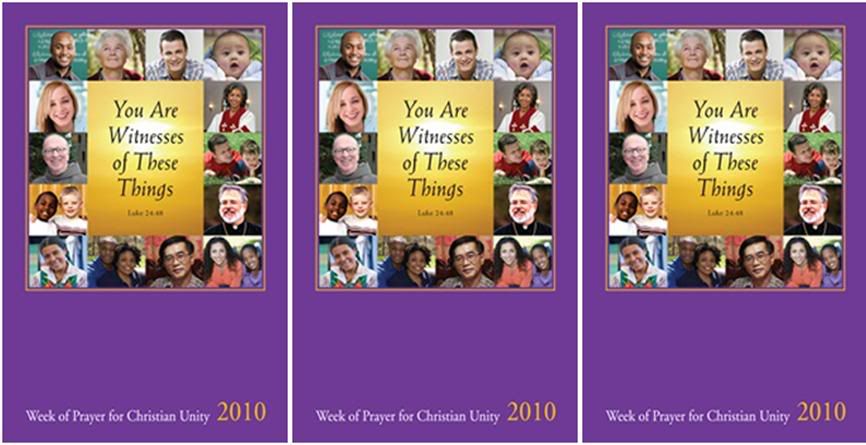
 Thursday, February 11
Thursday, February 11
10:30 St. Peter's Basilica
Mass for the Sick
Feast of Our Lady of Lourdes
World Day of the Sick
25th anniversary of the Pontifical Council
for Ministry to Health Care Workers
The Vatican released a statement on the meetings held in Rome Jan. 17-20 between the Vatican Commission
for Religious Relations with Judaism, and a delegation from the Israeli Rabbinate's department for
Relations with the Catholic Church.
[Modificato da TERESA BENEDETTA 16/01/2011 18:22] |
| |
 20/01/2010 15:09 20/01/2010 15:09 |
|
| | | OFFLINE | | Post: 19.315
Post: 1.957 | Registrato il: 28/08/2005
Registrato il: 20/01/2009 | Administratore | Utente Veteran | |
|
 Pope, Irish bishops plan
Pope, Irish bishops plan
February summit on child abuse
By SHAWN POGATCHNIK

DUBLIN, Jan. 20 (AP) – Ireland's Roman Catholic bishops are being summoned next month to an exceptional Vatican summit with Pope Benedict XVI to shape the Pontiff's response to child-abuse scandals, church officials said Wednesday.
A Vatican spokesman, the Rev. Ciro Benedettini, confirmed that the Pope has written to Ireland's bishops inviting them to the Vatican Feb. 15-16, but he declined to provide any other details.
Two Irish Church officials said the Pope planned to speak to Ireland's 27 bishops, three archbishops and Cardinal Sean Brady, both as a group and individually.
They said the dialogue would influence Benedict's planned pastoral letter to Ireland's 4 million Catholics following revelations of widespread child abuse within the Irish church.
Both officials spoke to The Associated Press on condition they not be identified because the Vatican is supposed to make all announcements about the meeting.
Normally, bishops gain a papal audience only once every five years. The precedent for such a gathering is Pope John Paul II's summit with U.S. cardinals in 2002 following exposure of a wave of child-abuse scandals in the American priesthood.
Irish government-ordered investigations published last year documented decades of Catholic cover-ups of child abuse within the Dublin Archdiocese as well as the church's Dickensian network of residences for troubled Irish boys and girls.
The Dublin report, published in November, examined the cases of 46 priests who molested or raped children — and why bishops told police nothing about any cases until 1995 when the first victims began pursuing civil lawsuits. It also documented how police and other state child-welfare officials treated Catholic officials with deference, ensuring that the church could protect pedophiles in its ranks.
May's published report on Catholic-run orphanages, residential schools and workhouses nationwide found that orders of Catholic brothers and nuns engaged in systemic physical, mental and sexual abuse of tens of thousands of children from the 1930s to 1990s, when the last of the institutions closed.
Both reports found that officials kept abuse cases secret to protect the church's reputation. A taxpayer-funded commission has already paid out nearly euro1 billion ($1.4 billion) to more than 12,000 surviving residents of the children's homes, while the Dublin Archdiocese estimates it could pay out more than euro20 million ($30 million) to settle lawsuits.
Four bishops implicated in the Dublin report last month announced their resignations for failing to tell police about abuse cases. But Benedict has confirmed only the departure of Bishop Donal Murray of Limerick.
The other three — bishops Raymond Field, Jim Moriarty and Eamonn Walsh — remain in office pending the Pope's acceptance of their resignations and could take part in the Vatican meeting.
Before that, the Irish Conference of Bishops announced an extraordinary meeting Friday at Maynooth, the only remaining Catholic seminary in the Republic of Ireland, to discuss the fallout from the Dublin report and their upcoming audience with the Pope.
The bishops' senior spokesman, Martin Long, said the bishops would discuss the envisioned contents of the Pope's upcoming letter to the Irish people.
|
| |
 20/01/2010 19:42 20/01/2010 19:42 |
|
| | | OFFLINE | | Post: 19.317
Post: 1.959 | Registrato il: 28/08/2005
Registrato il: 20/01/2009 | Administratore | Utente Veteran | |
|
 GENERAL AUDIENCE TODAY
GENERAL AUDIENCE TODAY
At the General Audience held today in the Aula Paolo VI, the Holy Father devoted his catechesis to the annual Week of Prayer for Christian Unity observed by all the Christian Churches from January 18-25.
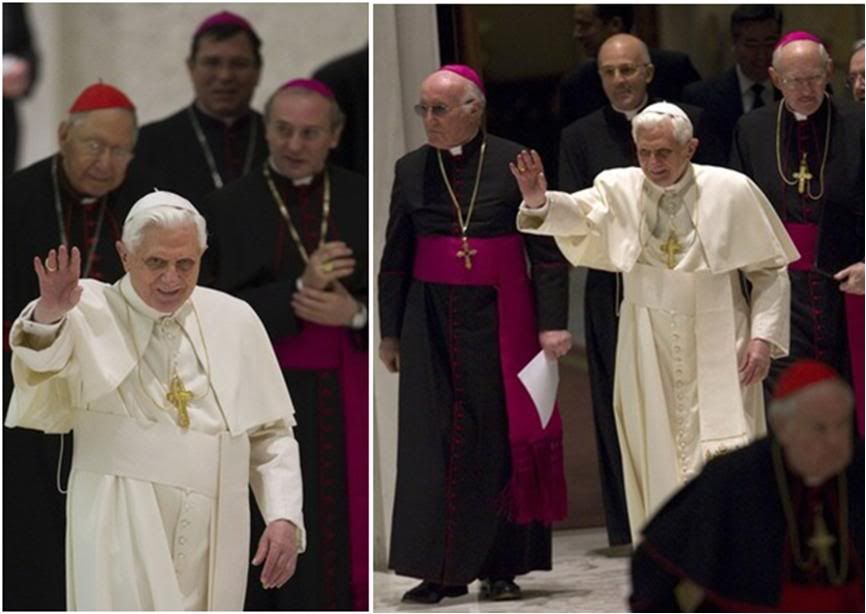
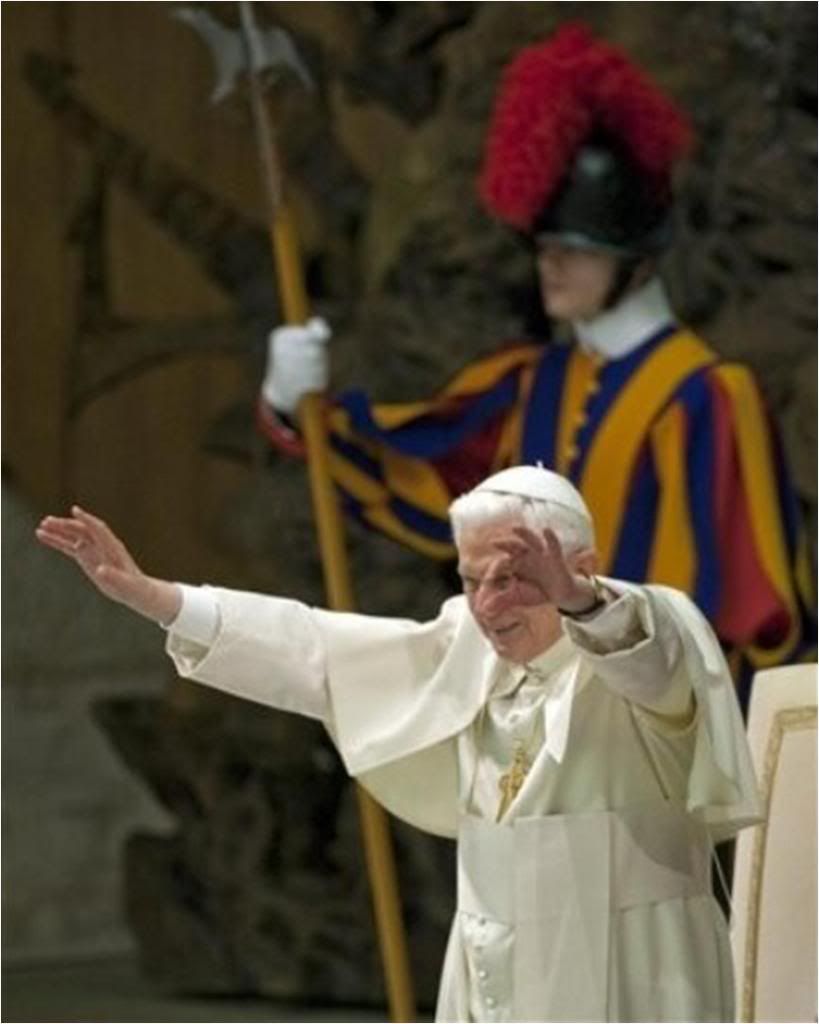
Here is how he synthesized the catechesis in English:
Today’s Audience takes place during the Week of Prayer for Christian Unity, when the Lord’s followers are asked to reflect on the tragedy of their divisions and to pray with him "that they may all be one ... that the world may believe" (cf. Jn 17:21).
The theme chosen for this year – "You are witnesses of these things" (Lk 24:48) – brings out this close bond between Christian unity and evangelization. This was a major concern of the Edinburgh Conference, which marked the beginning of the modern ecumenical movement one hundred years ago.
Today’s increasingly secularized society urgently requires a united witness to Jesus Christ grounded in a common profession of faith, as well as fraternal cooperation between separated Christians, dialogue and deeper reflection on the points of continuing divergence.
During this Week I ask all of you to join me in praying for these intentions, in thanking God for the ecumenical progress made in the past year, and in asking that Christians of our time, by growing in unity, may offer an ever more convincing witness to the Risen Lord.
In this Week of Prayer for Christian Unity it is a particular joy to welcome the members of the Continuation Committee of Ecumenism in the Twenty-first Century. Upon all of you and your families I cordially invoke God’s abundant blessings.
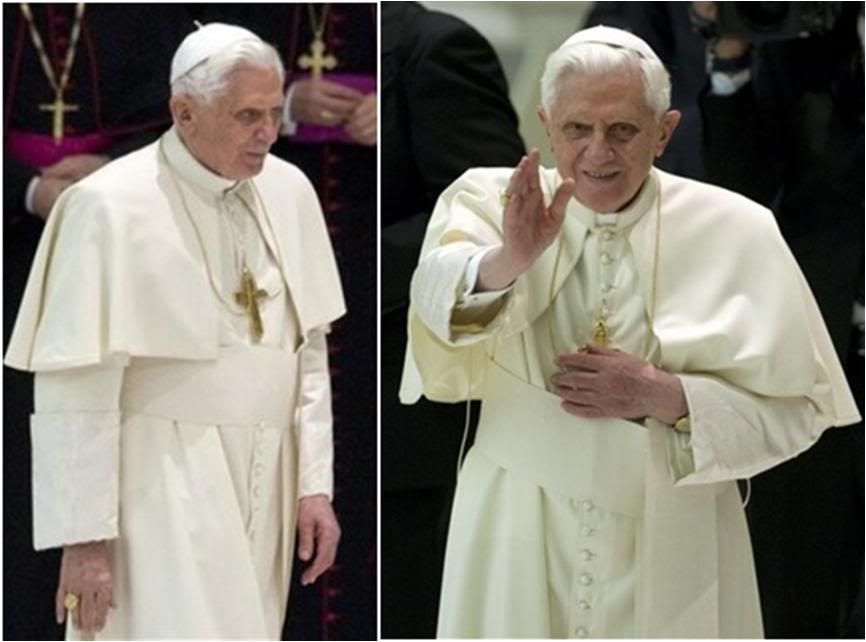
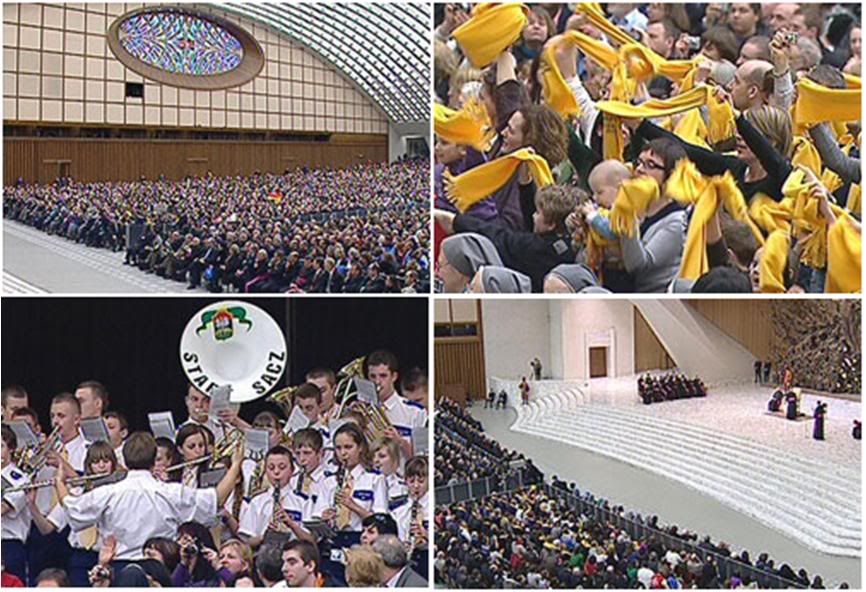
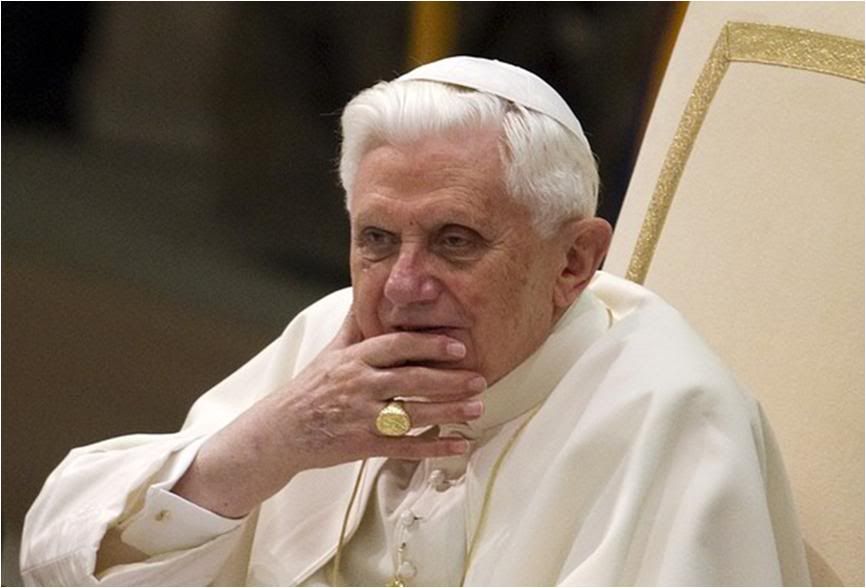
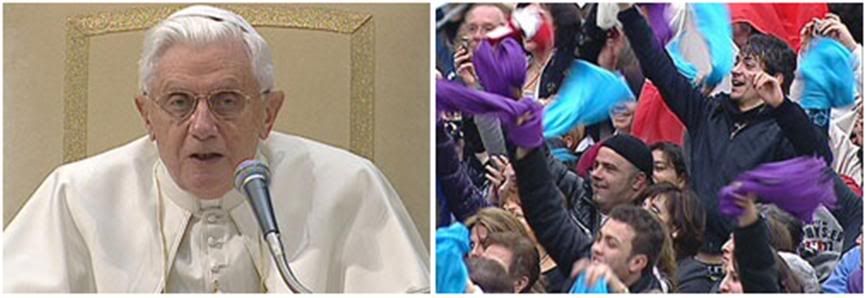

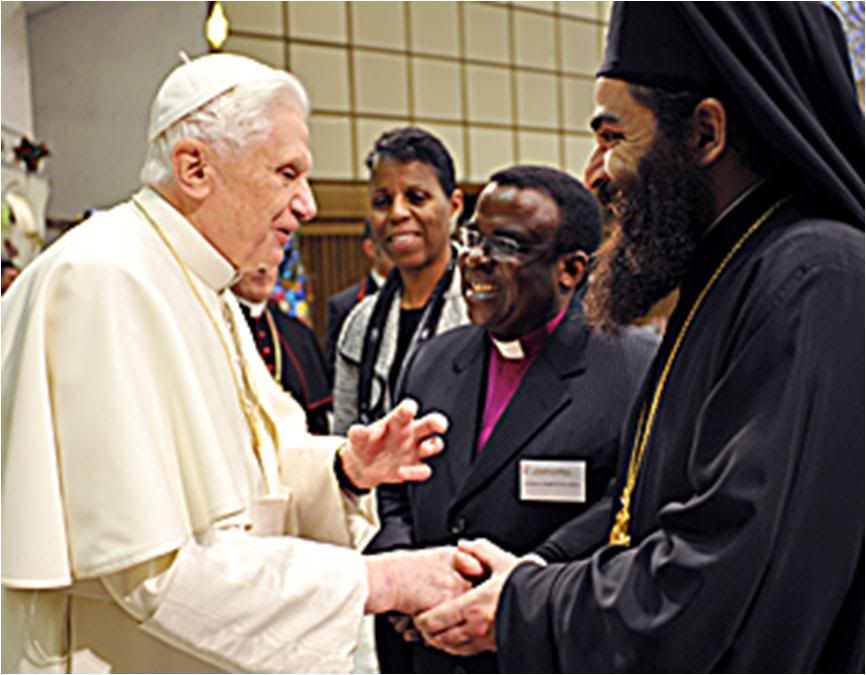 Above, the Holy Father greets members of the Continuation Committee on Ecumenism in the 21st century, among them, Nigerian Methodist Minister Michael Kehinde Stephen, Committee secreary, who had been a fraternal delegate to the Synod on Africa last October; and Orthodox Archimandrite Jack Kahalil from teh United States.
Above, the Holy Father greets members of the Continuation Committee on Ecumenism in the 21st century, among them, Nigerian Methodist Minister Michael Kehinde Stephen, Committee secreary, who had been a fraternal delegate to the Synod on Africa last October; and Orthodox Archimandrite Jack Kahalil from teh United States.
Before going to the Audience Hall this morning, the Pope went to the so-called Founders' Gallery at the rear of St. Peter's Basilica - a courtyard in which founders of various religious congregations are honored with their statues in external niches of the Basilica.
He blessed the latest image added to the gallery - St. Rafaela María del Sagrado Corazón (of the Sacred Heart), foundress of the Handmaids of the Sacred heart of Jesus.
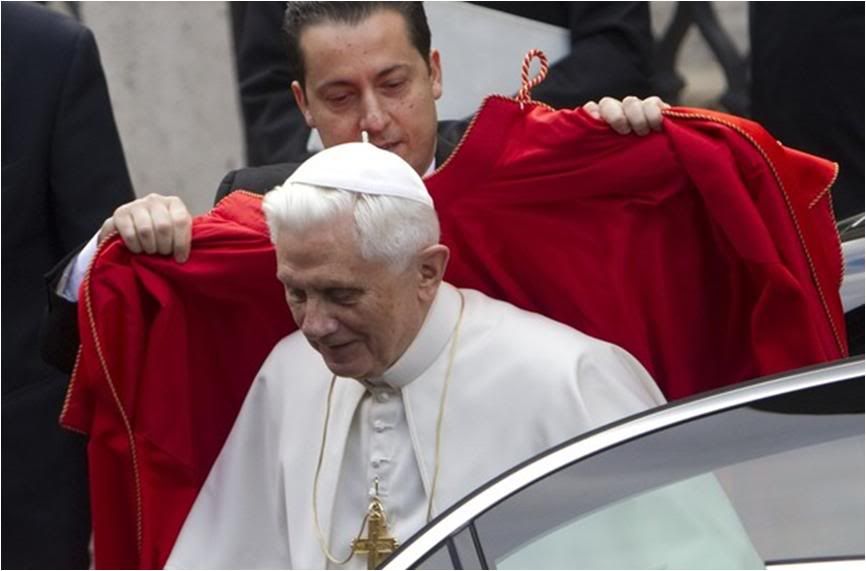
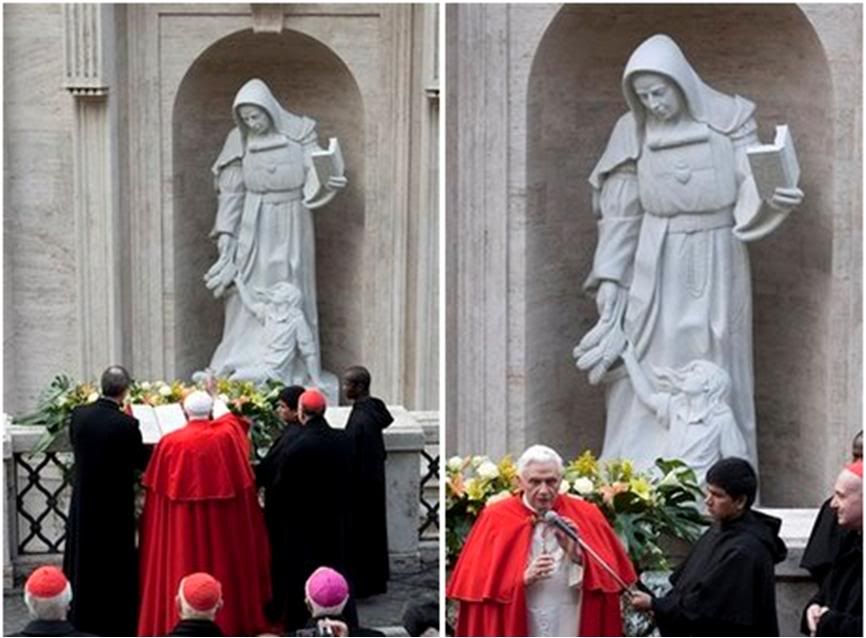 [Sorry, it's almost 4 p.m. and I just lost my translation of the full catechesis before I could save it. I don't know when I can go back to doing it.... I'm not exactly looking forward to doing it all over - it's easily the worst 'catechesis' I have yet seen. Nothing comes close to it. It was very obviously prepared by some functionary in the Council for Christian Unity, and is the most tedious bureaucratic bore! I commiserate with the Holy Father who had to plod through it! Maybe ZENIT has a translation that I can just lift and post in here.]
[Sorry, it's almost 4 p.m. and I just lost my translation of the full catechesis before I could save it. I don't know when I can go back to doing it.... I'm not exactly looking forward to doing it all over - it's easily the worst 'catechesis' I have yet seen. Nothing comes close to it. It was very obviously prepared by some functionary in the Council for Christian Unity, and is the most tedious bureaucratic bore! I commiserate with the Holy Father who had to plod through it! Maybe ZENIT has a translation that I can just lift and post in here.]
1/21/09
P.S. ZENIT does have an English translation now,
www.zenit.org/article-28108?l=english
but I find it a bit rough, so I will wait for the official Vatican translation to post.
[Modificato da TERESA BENEDETTA 21/01/2010 16:42] |
| |
 21/01/2010 03:35 21/01/2010 03:35 |
|
| | | OFFLINE | | Post: 19.319
Post: 1.961 | Registrato il: 28/08/2005
Registrato il: 20/01/2009 | Administratore | Utente Veteran | |
|

 Andrea Monda, a film and literary critic who wrote the story in the 1/20/09 issue of L'Osservatore Romano on Benedict XVI's audience with Rabbi Neusner, wrote a much longer article about the rabbi for Il Foglio. It turns out that he was with Neusner during the four days he he was in Rome. They had became long-distance friends when Monda called him for an interview shortly after the first volume of JESUS OF NAZARETH came out. I will only excerpt the part of the article that concerns the Holy Father.
The rabbi meets the Pope
Andrea Monda, a film and literary critic who wrote the story in the 1/20/09 issue of L'Osservatore Romano on Benedict XVI's audience with Rabbi Neusner, wrote a much longer article about the rabbi for Il Foglio. It turns out that he was with Neusner during the four days he he was in Rome. They had became long-distance friends when Monda called him for an interview shortly after the first volume of JESUS OF NAZARETH came out. I will only excerpt the part of the article that concerns the Holy Father.
The rabbi meets the Pope
by ANDREA MONDA
Translated from

January 20, 2009
...On the second appointment in Rome, we spoke at length right after the event because I had accompanied them to the Vatican. The account told by Neusner and his wife Suzanne was as follows:
"We arrived at the Cortile San Damaso [where visitors enter the Apostolic Palace] at 11:15, but we had to wait for some time before we were received because they said the Pope was running late with his appointments,
"They led us to a room, a very beautiful one, actually, but then we were asked to transfer to another room, which was even more beautiful... In short, we ended up being seated in five different rooms, all of them splendid. And each time, someone came in to apologize for the delay in the name of the Pope - all very courteous persons, each one speaking a different language.
"But no one ever told us where there was a rest room! I remember visiting the White House, where someone would keep asking us if we needed to use a rest room! Shows you how practical we Americans Are!
"then finally we were led to the Pope's library - but what a big room! - and we were truly electrified! He was so very kind, and immediately put us at ease. We were alone, the three of us, for about 15-20 minutes. Just the right time, I thought, for two professors.
"I had known him for years as a scholar and held him in high esteem. But now it was most interesting to meet the man himself... He is humble and kind. He does not feel it is necessary to fill silences between one sentence and the nest - he sets out to listen. And he retains the curiosity of the scholar - that, he has not laid aside.
"He asked me about my students, and I said I adored them! He smiled - he knew what I meant.
"What most struck me about him are his eyes, penetrating. They can look in you and through you.."
As Neusner spoke, I recalled a statement made by Pier Paolo Pasolini in his book on India, when speaking of Mother Teresa of Calcutta: "When she looks, she sees", and the Pope's own words in Deus caritas est, that the Christian should have 'a heart that sees' (No. 31).
Neusner goes on about this aspect of eyes and vision,
"Ratzinger is a man with a vision: for Europe, for the world, for mankind, for life (and against death). No one else today seems to have a vision. Politics everywhere is in crisis. But this gentle man knows exactly where he wants to go".
Did they speak of politics? Neusner says, "No, we did not."
What about the event at the Synagogue on Sunday? "Not that either."
Then what did they talk about?
"We spoke about or books, as professors do. I gave him two books - the Italian edition of one of my essays on the Talmud, and the German edition of A Rabbi Talks with Jesus. He was very pleased with this, since he had read the book in English, and also because, he said, 'They are not big books, so I will be able to read them', almost with a sigh!
"Then he spoke about this new book, the second volume of the JESUS book. He said he has finally finished it, and it will come out in six months. I asked him if he planned to write other books, but his answer - which seemed to betray his real wish - was rather negative: 'I am 83 and I have other things to do'.
"And so, I desisted from what I had intended to propose - that we write a book together."
I let Neusner speak on, about this strange meeting of two old professors who are once again thousands of miles apart [Neusner has returned to New York], and although they had been together for only 20 minutes, perhaps they both feel less alone.
[Modificato da TERESA BENEDETTA 21/01/2010 04:00] |
| |
 21/01/2010 10:44 21/01/2010 10:44 |
|
| | | OFFLINE | | Post: 19.320
Post: 1.962 | Registrato il: 28/08/2005
Registrato il: 20/01/2009 | Administratore | Utente Veteran | |
|
  Bernard-Henri Levy (born 1948) is a French public intellectual, philosopher, author and journalist who was one of the leaders of the so-called Nouvelle Philosophie movement which emerged in 1976 to rebut the excesses of the 1968 counterculture, and is apparently so well-known in France as to be referred to only by his initials BHL. This article was originally published in the 1/19/10 issue of Corriere della Sera.
On Benedict XVI and Pius XII:
Bernard-Henri Levy (born 1948) is a French public intellectual, philosopher, author and journalist who was one of the leaders of the so-called Nouvelle Philosophie movement which emerged in 1976 to rebut the excesses of the 1968 counterculture, and is apparently so well-known in France as to be referred to only by his initials BHL. This article was originally published in the 1/19/10 issue of Corriere della Sera.
On Benedict XVI and Pius XII:
Bad faith and disinformation
by Bernard-Henri Lévy
Translated from
the 1/21/10 issue of
 Editor's Note: We pick up from the January 20 issue of Corriere della Sera this commentary written after Benedict XVI's visit to the Jewish community of Rome.
Editor's Note: We pick up from the January 20 issue of Corriere della Sera this commentary written after Benedict XVI's visit to the Jewish community of Rome.
It is time to stop the bad faith, the partisanship, and, to say it all, the disinformation, whenever it has to do with Benedict XVI.
Since his election, he has been tried by publicity for his 'ultra-conservatism' which is continually drummed up by the mass media [as though a Pope can be other than 'conservative'].
And media has insisted on insinuations, if not heavyhanded direct digs, against the "German pope", the 'ex-Nazi' in a cassock, a figure that the French satirical program Les Guignols did not hesitate to dub 'Adolf II'.
They have falsified texts - simply and purely. For instance, regarding his trip to Auschwitz in 2006, they have sustained - and since memory becomes less certain with the passage of time - they continue to say that he had paid tribute to six million Polish deaths [the Pope, after all, was visiting Poland and was speaking on Polish soil] at the hands of a simple 'gang of criminals', without noting that half of those Polish victims were Jews.
But the untruth is even more amazing, considering that in the same address, Benedict XVI spoke of "the powers of the Third Reich" who sought 'to eliminate the Jewish people' from the 'ranks of the nations of the earth", as Le Monde quoted him on May 30, 2006.
And now, with the Pope's visit to the Synagogue of Rome, after his visits to synagogues in Cologne and New York, the same chorus of 'dis-informers' have established their primacy - I was going to say, that they have carried off the palm of victory - because even before the Pope had crossed the Tiber to the Synagogue, they announced beforehand, urbi et orbi, that the Pope would not find the words he needed to say, nor make the gestures that he should make, and therefore was bound to fail in his mission...
While the event is still fresh, allow me to dot some i's.
When Benedict XVI stood in prayer before the commemorative marker to the martyrdom of 1021 Roman Jews who were deported to Auschwitz, he was doing his duty, but he did it.
When Benedict XVI paid tribute to the 'faces' of men, women and children caught in the dragnet of the Nazi plan to 'exterminate the People of the Covenant with Moses', he was stating fact. But he said it.
And when Benedict XVI repeated, word for word, the prayer John Paul II made, ten years ago, at the Wailing Wall in Jerusalem; when Benedict XVI asked 'forgiveness' once more from the Jewish people who were devastated by the fury of an anti-Semitism that was for a long time essentially Catholic, and in doing so - I must repeat - used the text of John Paul II, then the media must stop repeating like asses that he is 'backward compared to his predecessor".
Of Benedict XVI who said, after a second stop in front of an inscription marking a Palestinian attack on Roman Jews in 1982, that the Jewish-Catholic dialog begun by Vatican II is by now 'irrevocable'; of Benedict XVI who said he intended to 'deepen' the 'debate between equals', such as the Catholic discussion with 'their older brothers' in the faith, the Jews - media can do all the trial by publicity they want, but they cannot accuse him of 'freezing' the progress achieved under John Paul II.
As for the issue about Pius XII, one can always turn back to it, if so desired. I would go back to the case of Rolf Hochhuth, who wrote the famous play The Deputy, which in 1963, launched the entire controversy over 'the silences of Pius XII'.
In particular, I would revisit the fact that this impassioned executioner is also a patented negationist, who has been penalized several times as such, and whose last provocation, five years ago, was to come to the defense - in an interview with the extreme right magzine Junge Freiheit (Young Freedom) - of David Irving [the British military historian who is considered the world's leading preacher of Holocaust denial. The British press reported last year that when Mons. Williamson returned to London after the FSSPX dismissed him from heading the seminary near Buenos Aires, he contacted David Irving to consult him on how to present his views without causing a backlash!
BTW, in all the rivers of ink that have flowed about The Deputy - a work of Soviet propaganda which became for Pius XII detrators the Bible to swear by, God's truth handed down from Mt. Sinai - this is the first time I have read that Hochhuth is such a diehard negationist! Yet, he gets a pass from all the Pius XII detractors led by militant Jews, and all because he gave them the club with which to beat down on Pius XII and the Catholic Church - payback for centuries of anti-Jewish Christian hostility! How's that for irony!]
For now, I would simply like to point out - as Laurent Despit just did in the magazine I edit, La regle du jeu - that the terrible Pius XII, in 1937, when he was just Cardinal Pacelli [and Vatican Secretary of State], was the co-author of Pius XI's 1937 encyclical Mit brennender Sorge {With ardent concern], which even today is still one of the strongest and most eloquent anti-Nazi manifestos. [By most accounts, Pacelli, who mastered German when he was Apostolic Nuncio in Germany in the early 1930s, wrote the draft of the encyclical.]
For now, we must specify, in the interests of historical precision, that before opting for clandestine action - before opening up without publicity his convents to Roman Jews hunted by the Fascists - the 'silent' Pius XII delivered radio messages (most notably his Christas messages in 1942 and 1943) which earned him the tribute of Golda Meir after the war, who said: "During the 10 years of the Nazi terror, while our people suffered a frightening martyrdom, the Pope raised his voice to condemn the executioners".
And for now, one must wonder above all that, after the initial deafening silence that had descended over the entire world about the Shoah, Pius XII's detractors have made him bear all the blame, or nearly so - he who, among the leaders of his time, 1) did not have guns nor airplanes at his disposal; 2) did not spare his own efforts to share, with those who did have guns and airplanes, all the information that came to his attention; 3) saved directly, in Rome and elsewhere, a great number of those for whom he had direct moral responsibility.
The last touch to the Great Book of contemporary baseness: if you are Pius XII or Benedict XVI, you are both Pope and scapegoat.
The first reaction I have read so far to Levy's commentary is from Antonio Socci in today's issue of Libero. I will post a translation later, but he begins by caling attention to the fact that Levy's aricle was buried in page 14 of Corriere della Sera, where it was first published on 1/19, whereas the newspaper's Page 1 that day featured an article about the codfish and its sexual habits, which was the Culture section's main story of the day.
Should we be shocked? I am not, except that i have to ask: In these editorial decisions on placement, where was Paolo Mieli, the Corriere editor, who is Jewish and a historian who is much involved in defending Pius XII against the unfair attacks on him?
And where is Magdi Christiano Allam, deputy editor, to impose editorial common sense, that should be obvious but apparently is not, to the deskmen who control editorial placement - a commentary specially written on a very topical subject by one of Europe's leading intellectuals certainly deserves better play - and a spot on page 1 - than an essay on the codfish, no matter how scholarly this may be?
[Modificato da TERESA BENEDETTA 09/02/2010 13:16] |
| |
 21/01/2010 13:44 21/01/2010 13:44 |
|
| | | OFFLINE | | Post: 19.321
Post: 1.963 | Registrato il: 28/08/2005
Registrato il: 20/01/2009 | Administratore | Utente Veteran | |
|

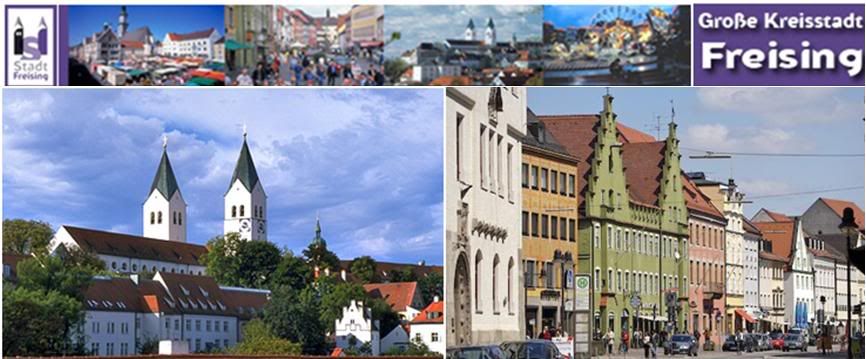 Last Saturday, 2/16/10, the Holy Father received a delegation from the city of Freising who came to confer on him honorary citizenship in that city which was the place of his priestly formation and ordination. He addressed the delegation extemporaneously in German, and the Vatican did not post the transcript until the January 20 issue of L'Osservatore Romano. I apologize for the delay in translating it.
Last Saturday, 2/16/10, the Holy Father received a delegation from the city of Freising who came to confer on him honorary citizenship in that city which was the place of his priestly formation and ordination. He addressed the delegation extemporaneously in German, and the Vatican did not post the transcript until the January 20 issue of L'Osservatore Romano. I apologize for the delay in translating it.
As always, when Benedict XVI reminisces about his early days, it is very moving for his candor, for the vividness with which he makes them seem alive, and for the inevitable and eloquent expressions of his abiding faith and his avowal of his priestly vocation. This is yet another speech to treasure.
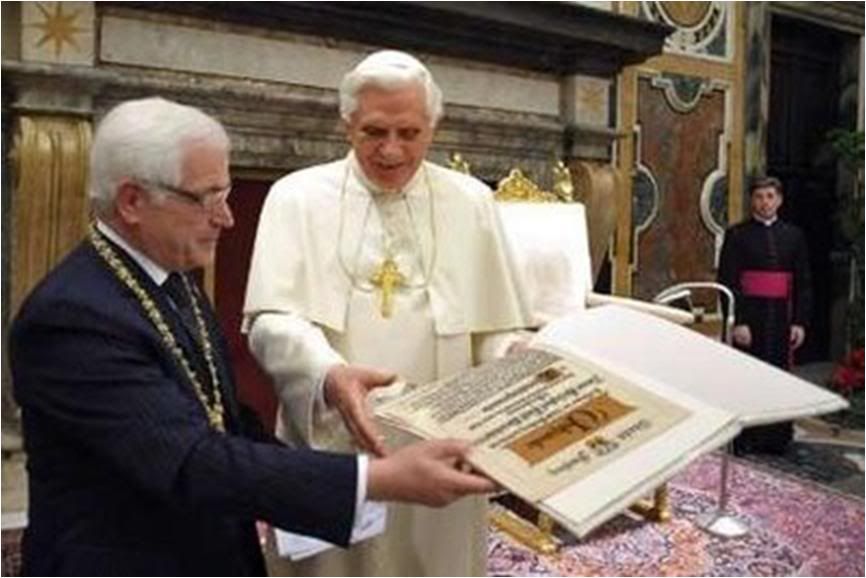
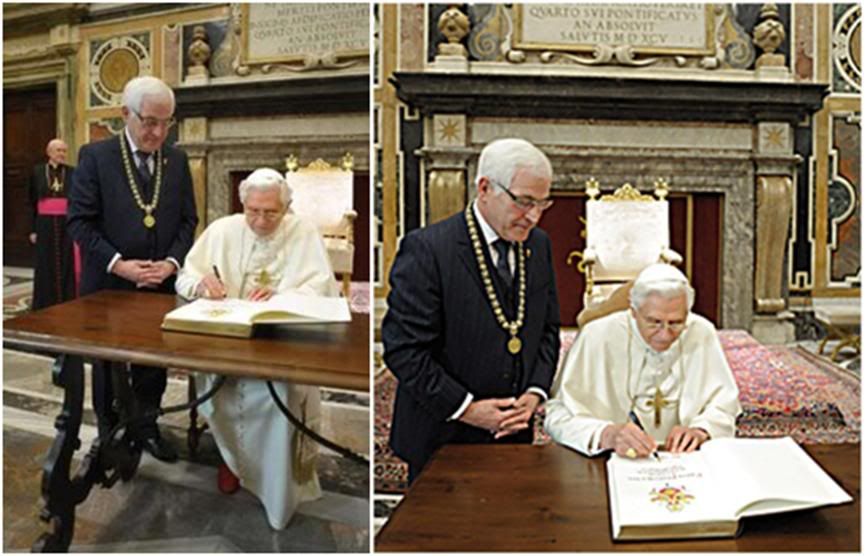
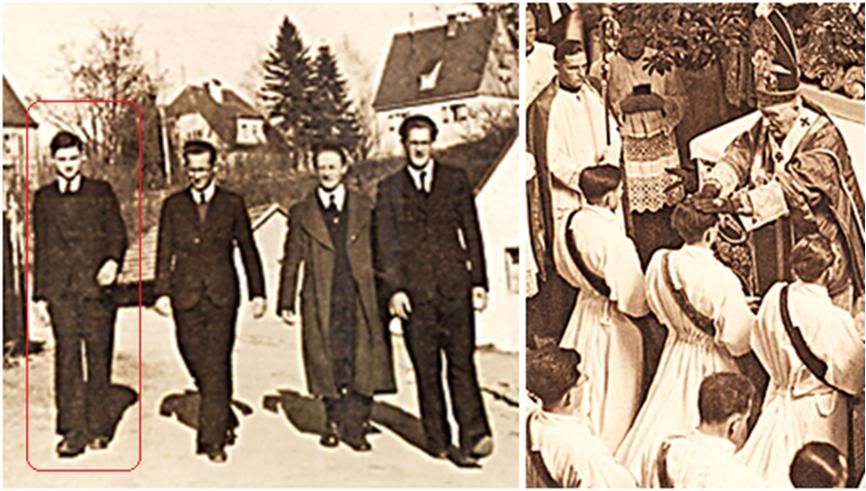 Archive photos used with the OR story: Left, seminarian Joseph Ratzinger, and right, Cardinal Faulhaber lays hands on Fr. Ratzinger at his ordination.
Benedict XVI reminisces
Archive photos used with the OR story: Left, seminarian Joseph Ratzinger, and right, Cardinal Faulhaber lays hands on Fr. Ratzinger at his ordination.
Benedict XVI reminisces
about his years in Freising
February 16, 2010
Mr. Mayor,
Dear Cardinal and Dear Archbishop,
Dear Auxiliary Bishop
Dear citizens of Freising,
Dear friends:
It is a moving moment for me to now be rightfully a Freisinger, and thus to belong in a far-ranging and profound manner to this city, of which I have always deeply felt part.
I can only say a heartfelt 'Vergelt's Gott' [the Bavarian 'Thank you' - literally, 'May God reward you!' ]. This is a joy that will henceforth be with me and stay with me.
In the biography of my life - the biography of my heart, I should say - the city of Freising has played a very important role. It is where I began the formation that has determined my life. That is why Freising is always within me, and I in Freising, wherever I am.
As you, Mr. Mayor, pointed out, that I have taken the Freising Moor and Bear into my coat of arms, shows the whole world how much I belong to Freising. That I am now also a citizen of Freising by law crowns this fact and fills my heart with joy.
This occasion awakens a whole panorama of memories in me. You have referred to some of them, dear Mr. Mayor. But I would like to bring up a couple of things.
First, there was the third of January 1946. After a long wait, the time had finally come for the Freising Seminary to open its doors to whose who had come home (from the war). Even if it was still a hospital for former prisoners of war, we could now begin our studies. It was a moment that was a turning point in our life - to finally be on the way to become what we were called for.
Seen from today, we lived a very old-fashioned and comfortless life. We lived together in dormitories, studied together in study halls, and all that [implying a communal life in which there was no individual privacy], but we were happy, not only because we had finally put behind us the menaces of war and Nazi dominion, but because we were free and above all, because we were finally on the way to achieving our vocation.
We knew that Christ is stronger than tyranny, that the power of the Nazi ideology and their mechanisms of oppression. We knew that time and the future belong to Jesus. And we knew that he had called us, that he needed us, that there was a need for us.
We knew that the men of those changed times awaited us, awaited priests who would bring a new impulse of faith in order to build a living house of God.
I must take the occasion to offer a little hymn of praise for the old Superior School to which I belonged first as a student and then as lecturer. There we had excellent scholars, even some with international renown, but the important thing, I thought, was that they were not just scholars but teachers, men who not only offered us the best fruits of their specialization, but for whom it was important to give the students the essential, the essential bread that they needed in order to feel the faith from within.
And it was important that we, if I must say so now, did not feel ourselves to be individual experts, but part of a whole - that each of us was working with all of theology; that with our work, the logic of the faith as a unity would become visible and would make it easier to proclaim the reason for our faith, as St. Peter said (1 Pt 3,15), to transmit it in a new time with its new challenges.
The second image that I hold on to is the day of my ordination as a priest. The Cathedral was always the center of our life - and we felt so much a family in the seminary, Father Hoeck had really made us into a family.
The Cathedral was the center and became so for all our life on that unforgettable day of our ordination. [Has anyone noted that everytime the Holy Father refers to the day of his ordination he calls it 'unforgettable' - an adjective he has never used to describe his election as Pope!]
Three moments are particularly impressed on my mind. First, was lying prostrate on the pavement while the Litany of All Saint was chanted. Lying there, one was conscious of one's total poverty and I had to asmy myself: Am I truly capable of all that this will entail?
But at the same time, one hears the names of saints throughout history and the invocation of the whole community of faithful saying "Hear us, help us!"
And with that, a growing awareness that "Yes, I am weak and inadequate, but I am not alone, there are others with me, the entire communion of saints is with me, they will accompany me, and so I can take this path and become a companion and guide for others".
The second was the laying of hands by the aged and venerable Cardinal Faulhaber - who laid his hand deeply and firmly on me, on all of us - and the awareness that in that gesture, the Lord himself was laying his hand on me, saying, "You belong to me, you are no longer your own, I want you to be in my service".
But there was also the knowledge that the laying of hands is a grace, that it not only meant conferring obligation, but above all, that it was a gift - that God is with me and that his love protects and guides me.
Then, the old rite, through which the power to confer the forgiveness of sins is transmitted in a separate ritual that began when the Bishop said the words of the Lord: "I no longer call you sevrants but friends".
And I knew, we knew, that it was not just a citation from John 15, that they were actual words that the Lord was saying to me. He was accepting me as a friend; I stood in his friendship now; he had gifted me with his trust, and in this friendship, I could work to make others friends of Christ.
The third aspect - which you also referred to, Mr. Mayor - is that I would now be able to spend the next three and a half unforgettable years with my parents in Lerchenfeldhof and so be home once again.
These last three and a half years of living with my parents was a great gift for me and truly made me feel that Freising was home.
I think of the celebrations we spent together on Christmas, Easter, Pentecost; how we would take walks in the fields, and go to the woods together to pick out a fir tree, and gather branches and moss for the Christmas creche, and wandering along the banks of the Isar. Thus was Freising really home for us and will remain home for me in my heart.
Today, beyond the gates of Freising is Munich airport. Whoever lands in Munich, or simply makes a stopover, will see the cathedral spires of Freising, can see the mons doctus ['learned hill'] and can perhaps sense something of its history and its present.
Freising has always looked out on the entire Alpine range. Through the airport it has also become, in a way, international, with a world outlook.
And yet I must say that the Cathedral with its spires indicates an altitude that is much higher and different from the altitude from which we descend when we get off at the airport - they point to the true heights, the altitude of God, from whom comes the love that gifts us with our true humanity.
The Cathedral points not only to the heights of God who shapes us and shows us the way. It also shows us the breadth of the Church - and not only because the Cathedral encloses centuries of faith and prayers, and the entire communion of saints, everything that we have believed, prayed for, suffered and rejoiced about.
It shows, above all, the great breadth of all the believers in all times, a breadth that goes beyond mere globalization, since the diversity, even the opposition, of cultures and origins, gives us inner unity, it gives us what unites us - the unifying power of being beloved by God. That is why Freising has been, for me, a trailblazer as well.
I wish in conclusion to thank you once more for this great honor that you have given me, including the brass band that has truly made Bavarian culture present here.
My wish - my prayer - is that the Lord will further bless this city. May Our Lady, Patroness of Freising Cathedral, protect her, so that Freising may continue to be, even in the future, a place for a human life of faith and joy. Many thanks.
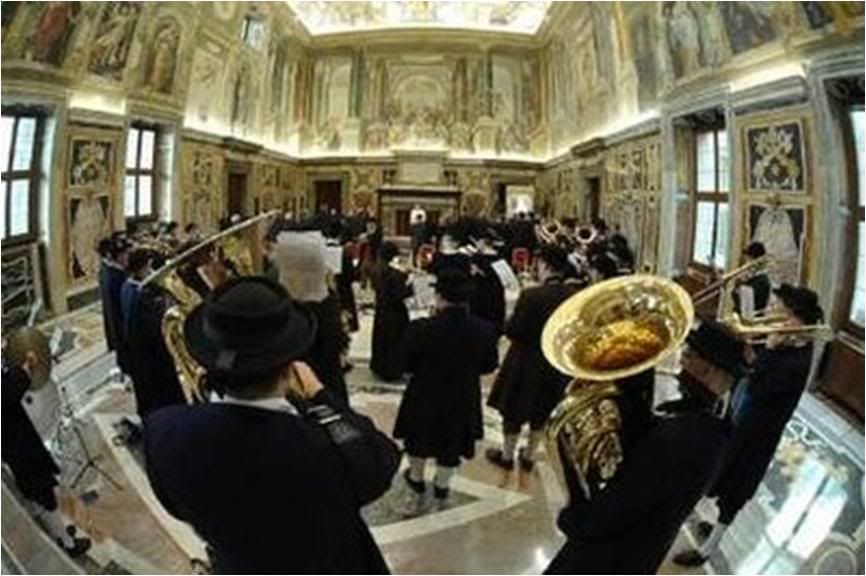
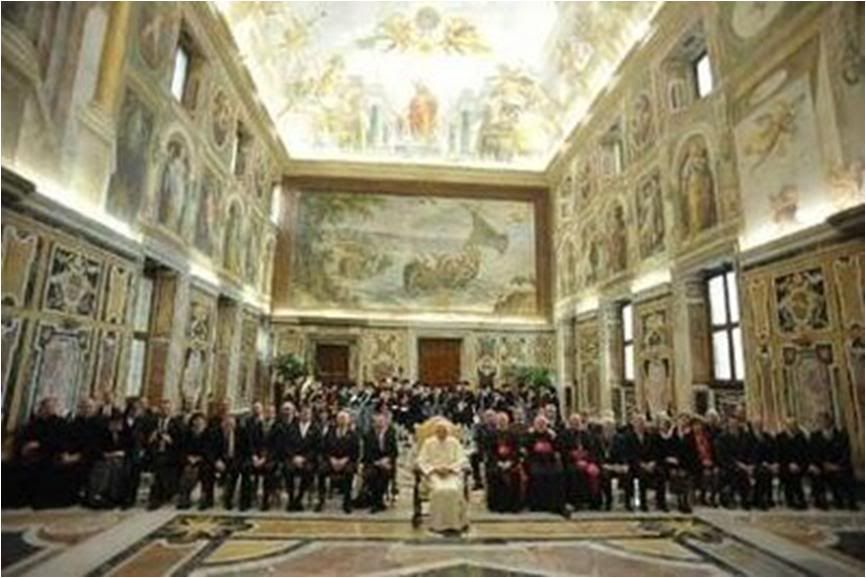
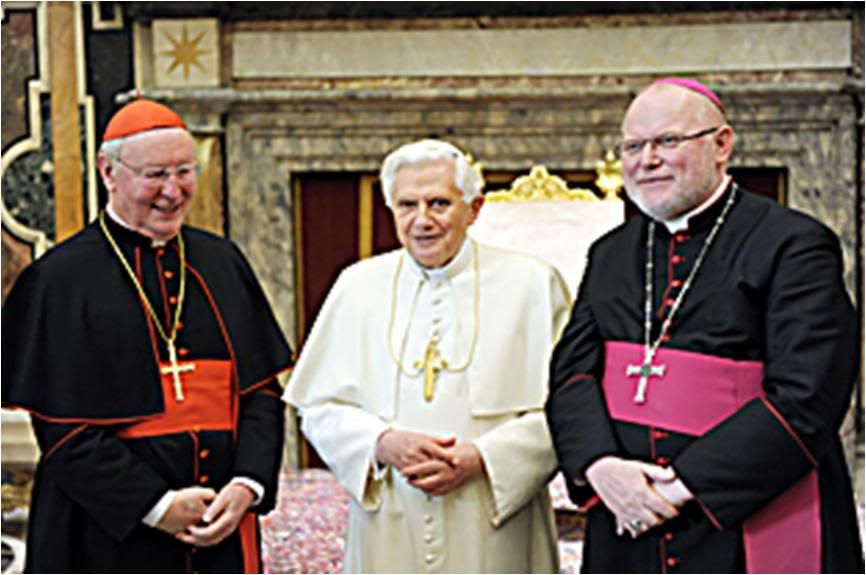 Benedict XVI with his two successors so far as Archbishop of Munich-Freising:
Benedict XVI with his two successors so far as Archbishop of Munich-Freising:
emeritus Archbishop Cardinal Friedrich Wetter (left), and current Archbishop Reinhard Marx.
[Modificato da TERESA BENEDETTA 22/02/2010 09:28] |
| |
 21/01/2010 16:04 21/01/2010 16:04 |
|
| | | OFFLINE | | Post: 19.322
Post: 1.964 | Registrato il: 28/08/2005
Registrato il: 20/01/2009 | Administratore | Utente Veteran | |
|
 Thursday, January 21
Thursday, January 21
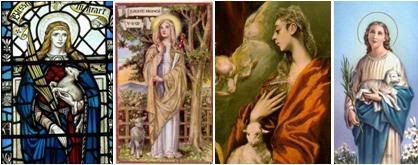 Third photo from left, St Agnes by El Greco.
ST. AGNES [Agnese] OF ROME (291-304), Virgin and Martyr
Third photo from left, St Agnes by El Greco.
ST. AGNES [Agnese] OF ROME (291-304), Virgin and Martyr
Born to a Christian family of the Roman nobility in the time of Diocletian, she is said
to have refused, at age 12-13, to marry the son of a Roman Prefect, who punished her
by having her dragged through the streets to a brothel. Legend has it that her hair
grew to cover her nakedness, and that those who tried to rape her were struck blind.
Finally, she was led to be burned at the stake, but the wood would not burn. She died
either by being beheaded or stabbed in the throat. She was buried in the catacomb that
bears her name. She is depicted with a lamb because her name resembles Agnus, the
Latin word for lamb, but it really comes from the Greek word that means 'chaste'. Every
year on her feast day, two lambs are brought from the Trappist abbey of Tre Fontane in
Rome to the Vatican, to be blessed by the Pope. Their wool is used to weave the palliums
that will be conferred by the Pope on the new metropolitan bishops named during the year.
The teenage saint is one of only seven women saints named in the Canon of the Mass.
Readings for today's Mass:http://www.usccb.org/nab/readings/012110.shtml
OR today.
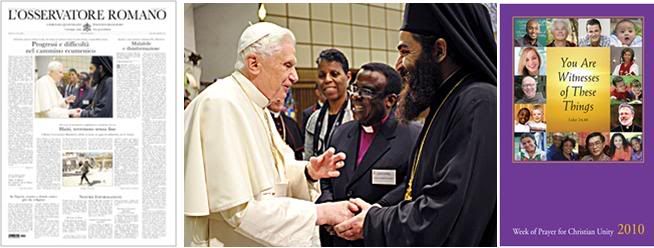
The Pope's catechesis on the Week of Prayer for Christian Unity:
Progress and problems in the ecumenical journey
Other Page 1 stories: The commentary 'Bad faith and disinformation' by French intellectual Bernard-Henri Levy
attacking the media for their biased reporting that makes scapegoats of Pius XII and Benedict XVI (translated
and posted on this thread earlier); a serious aftershock Wednesday throws Haitians into new panic, even as
the situation continues to be chaotic, eight days since the major earthquake; Nigerian bishop says new conflicts
in central Nigeria are ethnic and political in nature, not religious. In the inside pages, a report on the Jan. 18-20
meeting of the bilateral commission of the Vatican and the Grand Rabbinate of Israel on the protection of the
environment.
THE POPE'S DAY
The Holy Father met today with:
- Cardinal Ivan Dias, Prefect of the Congregation for the Evangelization of Peoples
- Cardinal Angelo Bagnasco, Archbishop of Genoa and president of the Italian bishops' conference (CEI)
- Mons. Javier Echevarría Rodríguez, of Opus Dei.
At 12:30 in the Urban VII Chapel, the Pope blessed two lambs traditionally brought to him on
the Feast of St. Agnes (see note on the saint above):
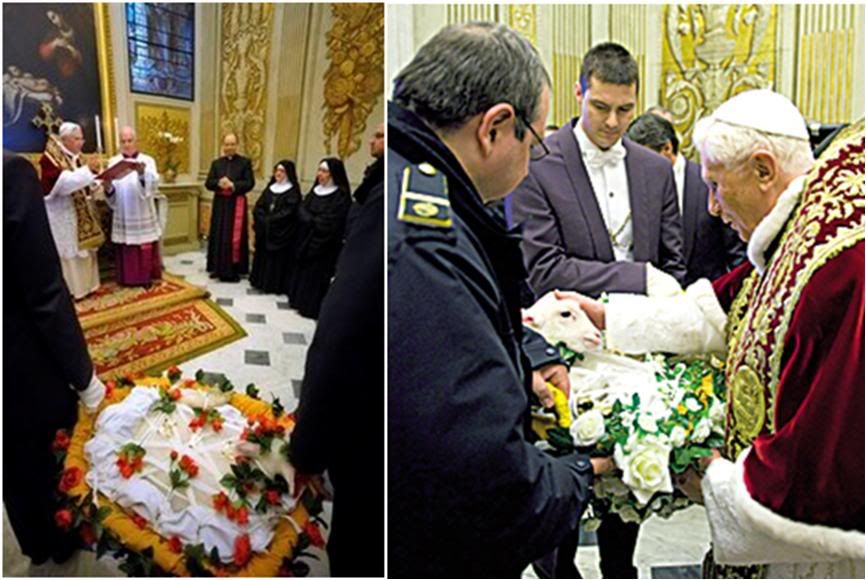
 Pope names laywoman to #3 post
Pope names laywoman to #3 post
at Council for Justice and Peace
By Cindy Wooden
Catholic News Service

VATICAN CITY, Jan. 21 (CNS) -- Pope Benedict XVI has named a laywoman undersecretary of the Pontifical Council for Justice and Peace, marking the first time in more than 20 years that a woman has served as undersecretary of a pontifical council.
The appointment of Flaminia Giovanelli was announced by the Vatican today. At the justice and peace council, she succeeds Bishop Frank J. Dewane of Venice, Fla., who held the position until 2006. The post has been vacant since then.
Giovanelli, 61, is a political scientist, who has worked at the council since 1974. As a council official, she had been responsible for issues dealing with development, poverty and labor from the point of view of Catholic social teaching.
The last woman to serve as undersecretary of a pontifical council was Rosemary Goldie, an Australian, who held the position from 1966-76 at the Pontifical Council for the Laity.
Giovanelli will not be the highest-ranking woman at the Vatican, though. Salesian Sister Rosanna Enrica serves as undersecretary of the Congregation for Institutes of Consecrated Life and Societies of Apostolic Life.
In a statement Jan. 21, Cardinal Peter Turkson, president of the justice and peace council, said the appointment of Giovanelli "demonstrates the concern of the Church for the promotion of the dignity and rights of women in the world," which is one area of special concern to his office.
Giovanelli was born in Rome and went to high school in Brussels, Belgium. She earned a political science degree from La Sapienza University in Rome, a diploma from the librarian program at the Vatican Library and a degree in religious studies from the Pontifical Gregorian University in Rome.
Since 2006, she has served on the Joint Working Group of the Catholic Church and the World Council of Churches.
[Modificato da TERESA BENEDETTA 21/01/2010 19:03] |
| |
 21/01/2010 20:29 21/01/2010 20:29 |
|
| | | OFFLINE | | Post: 19.323
Post: 1.965 | Registrato il: 28/08/2005
Registrato il: 20/01/2009 | Administratore | Utente Veteran | |
|


 Jews and Catholics are closer
Jews and Catholics are closer
than they are depicted - but
controversy makes headlines
by Bruno Mastroianni
Translated from

January 21, 2009
Someone should admit it.
The disproportionate amount of rumors, analyses and assessments that preceded and followed Benedict XVI's visit to the Synagogue of Rome has left us all somewhat dazed.
Almost catatonic or quite fed up, we may have allowed ourselves to be carried away by waves of opinion - positive or negative - reeled off relentlessly, with the ghost of Pius XII hovering, comparisons with the past [John Paul II;s visit], and an assorted mishmash of misinformation about the Good Friday prayer and other alleged (and unfounded) embarrassments committed by Papa Ratzinger against the Jews.
And so, overwhelmed by the drumbeat of the usual two or three conflicts that are the joy of editors and headline writers, we have been distracted from what really happened.
In that Synagogue, two religious leaders, one Jew, the other Catholic, both went to the root of what can truly resolve incomprehensions between the two faiths and construct a way to the future.
This is something far more radical than the diplomatic, historical and conciliar relationships between the two religions.
Papa Ratzinger and Rabbi DiSegni, in their addresses, both reiterated the only thing that can make men brothers and commit them to the common good: to know themselves as creatures of God.
And that is the real significance of the event: in the Synagogue of the Eternal City, a German Pope and a Roman rabbi joined efforts to remind the world that without God it will not get anywhere.
The media insistence on itches and open wounds is not for 'completeness' of information. It almost seems an evasive maneuver to shield themselves from the fundamental question irresistibly posed by the two protagonists of Sunday's visit.
While I agree with all of the above, I also wish that Rabbi Di Segni would keep to the level of his discourse at the Synagogue, and not revert to his usual shoot-from-the-hip reflexes anytime he sees a chance to score a political point off the Pope or the Catholic Church. I understand he has to play to his base, but it's not principled to be opportunistic. He has to find a more reasonable, less offensive way of reacting.
[Modificato da TERESA BENEDETTA 21/01/2010 20:30] |
| |
|
|
|
|